#how many other moments in this series have relied on teamwork again?
Explore tagged Tumblr posts
Text
and i really want to stress that teamwork has been a pretty central theme to this series since chapter 8 at the latest, and chapter 4 if you want to push it. like sorry you read the series with your eyes closed i guess
i also have to laugh my ass off at everyone complaining about "power of friendship" right now. this is *teamwork* you dumbasses; do you really think deku is besties with fucking gang orca
#how many other moments in this series have relied on teamwork again?#we got#usj#cavalry battle#vs stain#finals#summer camp vs pixie bob beasts#summer camp vs villains#bakugo rescue (from heroes and students both)#license exam part 1#license exam part 2#1a vs mirio#fatgum agency vs delinquents#ryukyu agency vs giants#shie hassaikai raid#1a cultural fest performance#deku vs gentle & la brava (villain side)#oh. missed one. league of villains vs shie hassaikai/snatch chase#heroes vs hood & dabi#1a vs 1b (purely teamwork part of the story)#league vs gigantomachia#league vs mla#endeavor & interns vs ending#heroes vs plf (multiple teams)#beginning of dark deku arc before deku abandoned all might :'(#deku vs 1a#star and stripe vs shigaraki. i guess. what were those airplanes up to#and finally this final battle which is just. example of teamwork after example of teamwork. lol.#the movies are all also teamwork focused too. especially heroes rising lmfao
3 notes
·
View notes
Text
Interview: Makeup Artist Douglas Noe on Loki’s Looks Through the Years & Creating Anew for ‘Loki’ [EXCLUSIVE]
Douglas Noe has been in Hollywood for three decades. An award-winning makeup artist, he’s worked on projects such as World War Z, Planet of the Apes, Spider-Man 3, I Saw the Light, and Birth of a Nation. On top of these impressive credits, he’s also been Tom Hiddleston’s personal makeup artist since joining the MCU in The Avengers, designing all of the looks for Loki’s subsequent appearances.
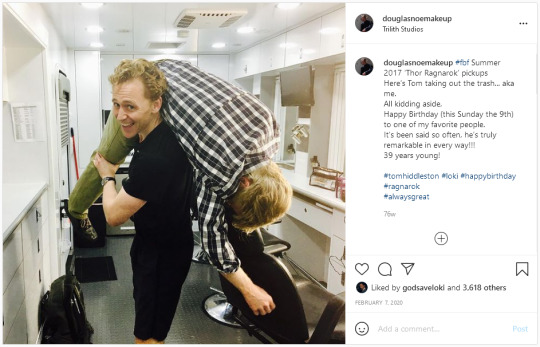
Noe has been nominated for three Emmys with one win, and five Makeup Artist and Hairstylist (MUAHS) Awards resulting in two MUAHS awards. His skills include creating making natural and period looks, prosthetics, hair, and tattoos.
Along with being the head of the makeup department for the most recent Disney+ series Loki, Noe is also creating looks for the new Netflix comedy series True Story starring Kevin Hart and Wesley Snipes.
We had a chance to chat with Douglas Noe about his work on Loki, The Avengers, the incomparable value of teamwork on set, and most importantly, Richard E. Grant.
Nerds and Beyond: So you started your Marvel journey with The Avengers, but what drew you to your field in the first place? And how did you get your start?
Douglas Noe: Star Wars was a huge influence to me as a young boy, both sketching and drawing, and a little bit of sculpting but not much. Cut to 1983, Michael Jackson’s “Thriller” comes out and I find a magazine called Fangoria on the newsstands where I can order blood and wax and pencils and fake hair. So, I started playing with these things. I was also taken with the horror movie craze that was happening in the early 80s — Nightmare on Elm Street and Friday the 13th, and others, obviously.
In High School, in 1984, I joined choir thinking I would get an easy credit, but my voice had not changed. So the choral instructor had been waiting for a boy soprano to do a theatrical opera presentation. So with that I sang the lead, I quit choir after that, because my peers were merciless, but, I learned the world of theatrical makeup which I hadn’t been introduced to.
I did years of theater. I went to a performing arts high school — it’s called Fort Hayes School for the Performing Arts in Columbus, Ohio — graduated, went to beauty school, and continued working in Ohio doing industrial, commercial, theater, and opera [makeup]. Worked for Maybelline and Revlon, got restless, worked in Cincinnati on my first film in the summer of 1990, it was July so 31 years ago, A Rage in Harlem. And my boss said you come to Los Angeles, I’ll make sure you get on your feet.
Nerds and Beyond: So you mentioned that it’s been about 31 years since your career started, what’s changed over the course of those 30 years in your field?
Douglas: How much time do we have? I’d say the biggest, biggest change would probably be the way we make these things now. Although another large change, more specific, would be the materials that we use. There’s a constant evolution and reinvention of almost all aspects of the materials that a makeup artist uses. That said, I have to shine a light on the way we do things now with the onset of digital and digital cameras. Shooting on film now has almost completely fallen by the wayside. Film was very forgiving, quite frankly, and now it’s not so forgiving. And because of that, the bar has been raised. The wonderful thing about this journey is watching my peers just get better and better and better, my colleagues rising to meet the challenge of not having anything to hide from with this new way we make films.
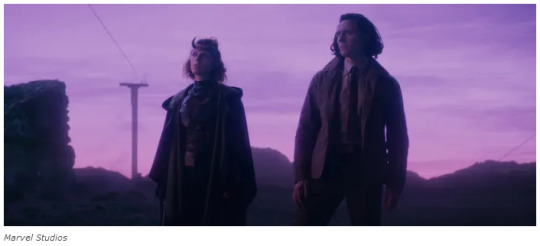
Nerds and Beyond: So, sometimes you kind of throw prosthetics to the wayside in favor of a more traditional makeup. How do you make that decision on which one to go with?
Douglas: That’s an excellent question. The decision is based purely on what are we going to see. That’s where I start, what is the lighting? I have a conversation with the director of photography and I find out what is the dynamic. Obviously, I know from the script whether it’s an interior or exterior, or if we’re exterior but we’re going to be on a stage, if it’s day or night. These variables all play into my decision as to whether or not I should rely on my theatrical experience and ability to paint 2D to appear 3D, or go ahead and make small prosthetics and put them where I need to put them and use actual prosthetics in lieu of paint.
That has everything to do with lighting, locations, logistics, and because most of his [Loki’s] wounds appear on his arm and some on his face in the Void, it’s all very moody and very dark. And again, the theatrical quality of the paint is not going to be altered by the changing light, it’s just going to react the same way the rest of the face is going to react. It’s purple light, it’s going to make everything have a purple hue. There was no accounting for any correction that didn’t need to be done. There wasn’t anything wrong with that. It’s real.
Nerds and Beyond: So, you did make up for not only Tom on Loki, but you helped plan out the looks for everybody?
Douglas: Yes, what I do is I surround myself with strong talent. It’s all about team. I designed Wunmi Mosaku, Gugu Mbatha-Raw, Sophia DiMartino, and Tom [Hiddleston]. Regarding the rest of it, Neil Ellis, both Dennis Liddiard and I, added to the elements of his scars and wounds, which you would only see in close-ups.
The rest of it, the parameters are set — Blade Runner to Mad Men — and stay in those confines. And obviously, I choose color palettes for the women and there are parameters set for the men, but then it’s about team. I’m a big one on a team and not putting my thumbprints on other people’s work, but rather build other people up so they feel like they own what they’re doing.
My team consists of artists that also have stronger resumes and quite frankly, skills that exceed mine. It’s the mutual trust that allows us to keep a high level of artistic integrity in every aspect of the job. It also means I get the very best from my team, and it shows on the screen.
So, I didn’t have every look in my hand. Dennis Liddiard designed the Mobius character and I had Ned Neidhardt run with Gugu and turn up the volume on some of the elements that she already possesses that we can play with. Her eyes and lips, I think Ned turned the volume on both. And because we’re shooting in order, it’s a progression in the makeup you did.
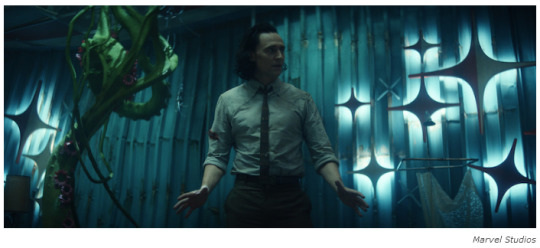
Nerds and Beyond: When it came to Sylvie and Loki, when you when you’re doing those, did you try to kind of plan them both to have any similar things to give them a Loki look?
Douglas: It’s a fair question, but the answer is no. So again, I think the characteristics and traits that were going to be similar among them, aside from wardrobe and costume hints, were all character driven. And I did nothing with the makeup and hair to try to make them look or even closely resemble each other.
Nerds and Beyond: I want to kind of back up a little bit to Tom in the first Avengers film. That was by far one of his most standout looks. Can you tell me anything about what went into the creation of that absolutely tormented, haunted look that he had throughout that entire movie?
Douglas: Yeah, and that’s probably one of the elements that, because the character has evolved, we kind of left with Avengers because by the end of Avengers, and we carried it into Endgame, he does have a bit of an edgier look in Avengers, and not many people pick up on it. But the reality is he’s a little sculpted in Avengers.
I remember sculpting his cheekbones and temples, and doing a little play on his forehead for when he’s in the cell on the Helicarrier carrier with all that overhead lighting. I did like a little devil horn shadow, which is so subtle. The only person who’s going to notice is anybody who looks back at it and having read this and knows what to look for, but it is so nuanced and so subtle. And that’s the only place I think we did that. But the rest of him is very much chiseled and sculpted, but it’s a light touch.
And I think, again, as he evolved through the Marvel Universe and into the other movies that was something that was easy to leave behind, because I think that look played directly into his evil desire to rule over Earth. We rested that design element with that storyline.
Nerds and Beyond: It’s very clear too and I’ve always loved looking at that, because I’m a huge fan of the character. I’ve always loved kind of comparing how he looked in that movie to the rest of them.
Douglas: You’re on to me!
Nerds and Beyond: I’m not! I swear [laughs] So, what’s your best method for making the actors comfortable in the makeup chair? And with the final outcome?
Douglas: It’s dialogue; listening, talking to them, talking to their representation, whether it be an agent or a manager, and doing my homework and doing my due diligence to find out what’s going to make them comfortable the moment they walk through the door. I do my homework on them. It’s not just IMDb, it’s an internet search. So, I spend some time on the web and find out who these folks are, and if I find out, for example, they’re not one that likes to talk a lot, well, the writing’s on the wall, we’re not going to talk a lot, we’ll cut to the chase and get to the point. But also, it’s about building a rapport and building a relationship. Also, knowing that, I’ve said this in previous discussions, knowing it’s necessary to get out of the way.
Like if, for example, I’m not a proper fit for somebody, I have to be plugged in, I have to be aware enough to understand that it may not be working before somebody says to me, “Hey, this isn’t gonna work.” So it’s just about being open, especially as Tom’s personal on these projects and running the department, knowing that I don’t get to do everybody. I don’t get to put my thumbprint on other people’s work. Because not only is that disrespectful, it’s very often unnecessary, because I hire good people. I hire contemporaries and peers. Truly, you’re only as good as your weakest crew member. I surround myself with good people.
So, take Owen Wilson, for example, it would have been wonderful to do Owen’s makeup, but there were times when he was not going to be shooting with Tom and I was going to need to be ready for Tom or available to Tom, so it didn’t make sense. So I never touched Owen, I had Dennis Liddiard design that look and run with it. And then Ned Neidhardt took over that look when Dennis had to depart. That’s just one example of not trying to do everything.
Another one was the Classic Loki. I wanted to do Richard E. Grant’s [makeup] so bad, I can’t even tell you. I’ve been a huge fan since 1987. I wanted so badly to bring that full circle, didn’t make sense. It just didn’t make sense. So again, I never touched him. It wasn’t necessary. Ned was always there. And I think the same thing happened to me on Ragnarok reshoots, which I ran in Atlanta again with Dennis Liddiard. I wanted so badly to do Sir Anthony Hopkins makeup, but it didn’t make sense. So I was happy to hand it off to Bill Myer.
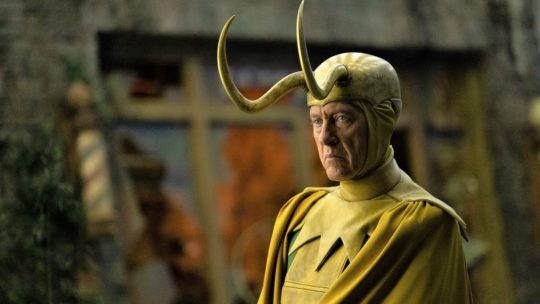
Nerds and Beyond: Oh man, I loved Richard E. Grant in this show so much.
Douglas: He’s amazing.
Nerds and Beyond: He’s so good!
Douglas: He really is. And he’s that good in person. He’s just so fun and interesting and alluring and attractive. He’s such a wonderful, wonderful person and, of course, a phenomenal actor.
Nerds and Beyond: I was watching little videos that he posted and he just seems like the warmest person.
Douglas: You know, just one last tidbit about Richard Grant is he’s got wonderful stories and as he’s telling them he’ll often stop and pause and just laugh. Just laugh, not for the sake of the stories or for anybody that he’s telling the story to, but because recounting the story brings him true joy. So he’ll stop and embrace that joy. Oh, it’s so wonderful.
Nerds and Beyond: That’s so amazing to hear. What is the most memorable job that you’ve done?
Douglas: The most memorable … That’s a tough one because I have so many fond memories of so many projects. The first Avengers film was memorable because there was a buzz, there was a vibration, a frequency, that was in the air when we were shooting that. We kind of knew we were making something big and something special. I don’t think any of us knew how big or how special it would be, but that certainly is one of the most memorable and most special projects.
I’m pretty good about focusing on the positive aspects of all these things, regardless of how difficult the project may be for whatever reason. The pros always, always heavily outweigh the cons, but I have a lot of wonderful, memorable experiences. Another one, it’s the polar opposite only because of the conditions in which we shot, but Birth of the Nation was one of the most memorable and exceptional experiences of my career. I was on the wrong side of 40, had 25 years of experience, and had still never worked so hard in my entire life. We did a 50-day shoot in 27 days. So proud of the work we did.
It was 100 degrees with 99 percent humidity, we shot it in the summer in Georgia, in Savannah, so it was hot, humid, and just getting the makeup necessary to be on individuals to stay put was its own challenge. And then the other challenges only added to that. But Nate Parker, the director, writer, producer, and lead actor, he is a special human being. And he was inspiring from start to finish. Usually, the first people in are the teamsters, transport department, and usually I’m second. He beat me in almost every single day. He’s in three hours before he needs to be. That was a very special experience.
Nerds and Beyond: Finally, are you excited about the news of Loki Season 2?
Douglas: I’m beyond thrilled! I invite being in the dark a little bit, I kind of like surprises and I like not knowing, so I suspected, but hearing the news confirmed, I was thrilled, naturally. What are they going to dream up? This is amazing. How do you top season 1 of Loki? That’s the burning question.
30 notes
·
View notes
Note
I personally don't understand people who think that Virginia 'can't win on her own'. As if she has to prove herself or she is 'too nice' and has to learn 'how to violence'. Just because Sevro's solution for everything is cutting some fingers or worse, doesn't mean he is always right or that Mustang's work to keep that balance and play within the designated lines is not badass or interesting. She is the only demokratic ruler and her own people gave her absolute power of decision making to end the war at any cost. What's not great about that!?
If Virginia was indeed 'too nice', she would have perished long ago - last absolute cinnamon roll we saw was Julian and we all know what Society thinks about people like him. Just because she plays by the rules, doesn't mean she has no claws - she wiped a terrorist's memories away for fuck's sake. Now that the rules have been extended, you can bet your ass that she'll take more than one page out of Nero's playbook. After all, she said it herself, she tamed herself, but it's fun to let the lion out.
Agreed 110%! I don't understand people who give Virginia shit in general tbh. I mean, how do you not fall in love with her immediately? How are you not ride or die for her from the get-go? It boggles the mind.
Those arguments, being "too nice" or being unable to win on her own, are reaching and easily debunkable. The lack of reading comprehension. 😒 If you don't like her, then whatever. I may not understand how that’s possible, but it really isn’t necessary to make shit up, you know?
Virginia can't win on her own, huh. The nerve! Where would Darrow be without her? Dead. Many times over. He would have bled out after Cassius stabbed him if Virginia hadn't helped him. And it was Virginia who brought the Howlers back from the Rim weeks in advance of Darrow actually needing them, just in case. So many things would have gone wrong in Morning Star if she wasn't at Darrow's side (and if Ragnar hadn't gone out of his way to make sure she'd be there, the absolute legend).
Perhaps it's Darrow who can't win on his own? But that sounds ridiculous, doesn't it? All of his successes were achieved through teamwork. Darrow acknowledges this many times. It's the same for Virginia. While it's simply not true that she can't win on her own, it’s also untrue that the inability to win on your own is a bad thing. The whole argument doesn’t make any sense.
The idea Virginia still needs to “prove” herself despite doing so plenty of times already throughout the series is frustrating. The fact of the matter is, the success of the Rising relies just as heavily on Virginia's intelligence as it does Darrow's battle skills. The Solar Republic simply wouldn't exist without her. Fitchner never had a clear vision of what "after the Society" would look like and neither did Darrow for a long time. The war effort needs a conscience and a vision for the future, otherwise it's just endless bloodshed. Virginia helps Darrow see beyond the bloodshed. Plus, Darrow has no interest in politics. He'd be the first to admit he’s not good at the slow game of political maneuvering. But Virginia thrives in that environment. In Dark Age, Darrow even admits his current predicament is a consequence of not trusting his wife's way of running the Republic, and he vows never to do that again.
Sure, Virginia doesn't get into physical fights often, especially now that she is Sovereign. But politics is no less perilous a battlefield. I feel like because the political battlefield isn't as flashy and fast paced as a literal one, people forget the constant danger she is in, even before the Senate's betrayal. Silenius' Stiletto is a delicate tightrope act she has to perform every day to drag progress forward while keeping her opponents in check. This requires a level of self-restraint, clear-headedness, and badassery, that no other character can achieve.
Virginia is not "too nice." She is practical. And often, is it practical to play nice. Not every confrontation is best solved through violence Sevro. We all know the line: Virginia is the mustang that nuzzles the hand; people know they can work with her. That’s why the people chose her consistently for ten years, over literally everyone else in the solar system, to run this new government. And her steadfast resolve to gain Imperium legally, to not force her will on the people, proved to them again that she won’t abuse this ultimate power to end the war.
No, Virginia may be reasonable but that doesn't mean she is too nice. If she was too nice, she wouldn't have used her relationship with Cassius to protect her family. She wouldn't have shot Cassius in the throat with an arrow. She wouldn't have promised Ephraim he would "die shitting in a foreign bed" if he skipped about on their bargain to return the kids. She wouldn't have zapped the Duke of Hands' entire personality from his head. Like you said, she never would have made it this far if she was truly toothless. She's practical, and sometimes the practical solution doesn't require violence, but creative thinking.
Speaking of creative thinking, one thing Virginia doesn’t get nearly enough credit for is abolishing the death penalty immediately after Adrius was hanged. That wasn't her being "too nice" or too lenient on her caste. Yes, she feels life in prison is the moral option over the death penalty. But she knows her people. The punishment for the worst criminals in Deepgrave is a Gold's worst nightmare. Life in prison denies a Gold their desire for a glorious death, to be remembered through the ages for their deeds in battle. The Republic's justice system sends a clear message: "Mess with us, and you won't get your notoriety or fame, you'll only get obscurity and shame and sucking algae through a tube until you die naturally of old age." That to me is crueler than hanging.
Virginia’s mind is her greatest weapon, but more than that, her greatest strength is how she applies her intelligence. Her ability to read people, and to communicate, is greatly underappreciated imo. These skills require nonviolent interaction yet they yield great results. There are many examples of this. She used her natural charisma to gain Octavia's trust. She brokered an alliance with the Rim when she thought Darrow was dead. She held the Republic together for ten years despite constant, increasing animosity from the Vox. She refused to torture Lyria and was able to see she was not lying about being an unwitting pawn in the kidnapping scheme and was rewarded with information and a new ally. She figured out exactly what Sefi was planning for Cimmeria, even manipulating the situation to her advantage without Sefi realizing it. She knew Victra was going to bargain with Sefi for the kids, without being told. In her own words, this is simply what she does.
There is a quote in Iron Gold that caught my eye: "Communication is the soul of civilization." (532) Now, this line has nothing directly to do with Virginia. This is Ephraim trying to get a rise out of Gorgo. But it fits Virginia perfectly, doesn’t it? The Republic is able to exist as a civilization because it has such an amazing communicator at its center.
Virginia is such an excellent communicator that she is even able to get parties who refuse to communicate with her initially to reciprocate communication eventually. She convinces Sevro, Dancer, and even Victra to stop freezing her out and work together. She does this by speaking their "language." She knows exactly what to say or what to do to get them to finally listen to her. Revealing she already knows exactly what is going on works for Sevro, providing hard evidence of conspiracy works for Dancer, and proving her actions (showing her scars) works for Victra. This isn't to say she never makes mistakes. She shouldn't have called the Wardens on Darrow, for example, just as Darrow shouldn't have kept the meeting with the Society "diplomats" a secret from her and the Senate. But more often than not, her nonviolent communication skills yield valuable results.
As for Virginia apparently needing to learn how to use violence… While Victra and Sevro’s feelings were justified, their actions at the end of Iron Gold and the beginning of Dark Age were just wrong, wrong, wrong imo. Freezing out Virginia did nothing but delay the return of the kids. It's frustrating to think how much heartbreak could have been avoided if they'd just put their heads together from the moment the kids disappeared. And what exactly did Sevro's rampage through Luna's underground accomplish? Some dead Syndicate thorns, sure. But that tantrum put a huge target on Sevro's back. As Virginia said, one lucky sniper and boom, no more Sevro. What would Victra have done then?
While it may feel like Virginia would have achieved more if she just beheaded some people, she has a responsibility as Sovereign to consider the bigger picture. She has to consider the Stiletto. If the Vox saw her offing some fools it would have added credibility to their smear campaign. The people would have lost faith in her and think she turned into another Octavia. Whoever replaced her could use her actions to justify their own dictatorship. Violence was simply not practical for her until she legally gained Imperium. Now though… 😈
Virginia's over here playing 3D chess while everyone else is playing Connect Four, but this still isn’t enough for some people. After the clone gets the better of her, she gets flack for not being an omniscient god and just knowing her twin brother laid out a plan to clone himself ten years ago. Tut, tut, should have seen that one coming, despite the lack of evidence. If only she’d punched some people. (Can you see I hate this argument with every fiber of my being?)
In Dark Age, Ozgard says this about Electra and Pax: "She is better fighter. He is more dangerous human." (184) Well, Pax gets it from his momma. Pax and Virginia may not be able to throw devastating punches but in many ways, their intellect is what makes them the greater threat to their enemies.
Thank you for the ask!
#virginia au augustus#red rising#iron gold#dark age#iron gold trilogy#dark age spoilers#astreamikaelson13#sorry I disappeared for like a week#I'm back writing unnecessarily long posts#my post
44 notes
·
View notes
Text
Anyways, here’s that essay
Please keep in kind this was not written to be consumed by people familiar with the source material, it was for a class. It’s focused on weird stuff and was meant to compare and contrast the Judas Contact storyline and season two of Titans.
Okay, here we go.
In 1984, a four-part story was published as an arc in Tales of the Teen Titans titled as The Judas Contract. Since, it has become one of the most influential and well-known stories to come out of the DC publishing company for its bold story choices and permanently changing characters who had been around for decades, as well as introducing death as something that can occur in the present, not just in the mechanics of a backstory. It garnered four separate adaptations, the most recent of which being the second season of Titans, a loose live-action version of the titular team. Between the two, there are many small plot and character details that do not line up, so for the sake of simplicity, pedantic plot elements will be removed from the comparison, instead focusing on individual motivation, the importance of the setting, and how characters are impacted and changed by the actions in the narrative.
The Judas Contract proper follows a team of pre-established young heroes being unknowingly spied on by their newest superpowered member, Tara Markov. She works alongside Slade Wilson, a mercenary and personal rogue of the Teen Titans, feeding him important information in order to fulfill his contract to kidnap them, hence the title of the arc; there is a Judas among them. The contract is almost completed until Slade’s son, Joey, enters the picture, determined to prevent any more death at hands of his father, emotionally conflicting Slade enough for Tara to feel betrayed and collapse the cavern they had been in, killing herself in the process. In the end, it is her story alongside the former Robin, Dick Grayson, who is inspired to take up a new vigilante identity as a result. Titans, has the same basic idea of there being a mole in the group and the evolution of Dick from Robin to Nightwing, but the surrounding plot and progression are entirely different. The Titans had existed previously, but broke up due to a series of events involving Slade, starting with the murder of a teammate, and ending in the death of Joey. There’s much grief and trauma surrounding this, so when years later Dick decides to reopen the team’s old headquarters to house and train new young heroes he stumbled across, his old friends are a mix of angry, re-traumatized, and reluctant, especially with the re-emergence of their aforementioned enemy. In the place of Tara, there is Rose. Daughter of Slade and, again, the spy on the team who, unlike Tara, has a change of heart and reveals her betrayal in an attempt to warn her newfound friends.
The most striking element of both is the use of character, and in what direction the agents go in, especially in light of the overarching themes that they share; that of redemption, recovery, guilt, and betrayal. In the comic, the focal point for all of this is Tara. She is continually treated well by her teammates whom remain compassionate to her, despite her brashness and tendency to get violent. They know little of her, yet still welcome her into their home and personal lives. It is revealed to the audience early on that Tara is working for Slade, which makes each interaction she has with those she is deceiving all the more upsetting, even distressing to watch. Tara’s particular flavor of trauma deals with abandonment, something she acquired after being forced out of her home country, which later developed into malignant narcissism. She becomes very attached to the idea of being in a position of power and finds comfort in the presence of Slade, as he was the first person to justify her being alive. Tara, in the end, fails to redeem herself, instead the illusion she had built of stability and power came crumbling down after she spends ally after ally until there is no one, and she has no power left. Though it’s somewhat cynical, the idea here is that these cycles of betrayal and neglect cannot always be broken, that’s the point of this character; sometimes people are just too dysfunctional and if they are not willing to put in the work to get better and heal, they just won’t.
Rose, Tara’s counterpart, goes through a very different metamorphosis, despite the setup being similar. Her initial motivation was revenge for the brother she never knew, having been told it was the Titans who killed him when in fact it had been Slade, though it wasn’t intentional. Slade, however, blamed the Titans, specifically Dick, thus Rose believed him and was willing to participate as a double agent. When she encounters them for the first time, she is met with sympathy and understanding, people who didn’t value her as a weapon, creating incongruity with the story she was fed of elite fighters and master manipulators. Upon learning the truth about the circumstances under which her brother died, and who exactly killed him, she backs out. Rose realized she was lied to and manipulated, almost immediately grasping the gravity of the situation and seeing how hard she was pushing people whose greatest crime was daring to care about the very person she thought she was avenging. Later, she tells her newly acquired love interest the truth, following it up by saying, “I’d take it all back if I could. But I can’t.” (Zhang). Where Tara failed, Rose succeeded; she got rid of the poison in her life and recognized that she was the bad guy, alongside seeing the humanity of those she attempted to sabotage.
The theme of redemption and recovery doesn’t stop with Rose. It is furthered by all the other existing characters, young and old. On the basis of new beginnings for the second generation, and moving past the collective trauma and fear associated with teamwork for the first. More so than anyone else, this idea is present in the journey of Dick Grayson. In the original story, he is motivated to save his friends from an ugly fate while in the throes of a very real identity crisis involving the title of Robin, which he had recently discarded, believing that it was time for him to grow past the role and create a legacy entirely his own. Which he does do; he rebrands himself as Nightwing, rising to the occasion and overcoming the difficulties of abandoning a role that represented his culminative childhood and heritage to do save the people he loves. It is very much about the conquering of his external obstacles.
This is not the case in Titans, it is largely about his spectacular fall from grace and the struggle of building himself back up from rock bottom. He had kept a secret from all his closest friends about the death of Joey; he told them Joey was murdered before he found him, when in fact, he wasn’t. Joey died trying to protect Dick from Slade, and Dick felt so much guilt and shame in having been partially responsible that he lied about it for years. When his teammates find out, his worst nightmare comes true: they leave him. He is with next to no support, devoid of the family he fought tooth and nail to keep together, and is left in the tomb of his last chance to remain stable. While Rose and Tara had to redeem themselves to other people, Dick’s story is a redemption to himself, not anyone else. He stops doing things for other people and imagines himself of deserving the loneliness of, in essence, being re-orphaned. In a desperate attempt to find forgiveness, he seeks out Slade who, instead of offering the sought after peace of mind, says, “I sentence you to live alone (…) Forever knowing that your Titans family lives and breathes somewhere out there in the world, but you can never be with them.” (Morales). His lowest point is monumentally more devastating than his comic counterpart; he isolates himself entirely, going as far as to get himself jailed to carry out the self-imposed punishment, expecting to be abused and killed alone in a prison, the prospect of death barely startling him. In moments like this, the tragedy of the character hurts so much more because the audience knows that if he gets knocked down, he may not get back up, he has every reason not to. Which is why it is so earnest and exhilarating when he does. Dick was broken down to his factory parts, every mistake and bad trait not only was put on display, but magnified. He was made to confront those things before being able to piece himself back together, only then could he take on a new identity as Nightwing. Seeing him fall again is tangibly damaging to the character, so seeing him climb his way back up, scratching, clawing, slipping up, and struggling all the way, it’s all the more satisfying when he reaches the top.
A large part of this fall and rise, or in the case of The Judas Contract, the lack off a fall, is to do with the setting. The comic has all their main characters living in relative harmony or with their own spaces. When they are not off stopping cults from destroying political landscapes or battling supervillains, they are at home, going about their daily lives as somewhat normal people with jobs and relationships. It exemplifies that they all have a decent grasp on who they are, and even if they don’t, they have a bed to go back to and a support system to rely on. This is an established team with a running headquarters, lovingly named Titans Tower, the scene is only a part of the narrative as the backdrop, as a story punching bag that ultimately doesn’t matter, and that is all it needs to be. The story is much more interested in the series of events taking place, otherwise known as the act. Everything that goes down becomes a spoiler because there are so many plot points to cover and twists to reveal, thus the scene becomes story fuel, which in turn fuels the act, fueling the actors. There is less of a fall because they all have a home to turn to; it is built around the idea that the primary agents are at least somewhat realized people, with lives of their own. They react to the world around them as it throws obstacles, and the idea is re-enforced by the irrelevance of where the action takes place, wholly opposing the priorities of its live-action adaptation.
Not to say that Titans doesn’t jump from place to place, in fact it shifts its characters around quite a lot, but those moves are reactions to and influenced by the primary setting. The Titans operate out of, again, Titans Tower, but instead of a home and safe place, it is a monument to their old team’s sins. A ghost town that continues to haunt them, bringing back their darkest times and motivating nearly every move they make. When they first arrive, it’s tense, they’re subconsciously expecting the worst and prepare to bail at the first signs of trouble, which they eventually do. It is their return that sparks the entire story moving forward, and the presence of a looming shadow built from mistakes colours their reactions and triggers a sort of trauma response. Conversely, it is a beacon of hope and rebirth for the younger members. It is the first place wherein they have been allowed to be themselves, even at their worst, then collectively learn to get better as a group, a family even. The motif of past and present, trauma and recovery, informs the presentation of Titans Tower, making the growth visible in ways it previously hadn’t been. Using the setting as story plays into how Titans is structured; it drip-feeds the audience information, allowing the plot to meander so each development can happen and be processed before the next major plot point kicks in, and if they lose the setting, their home, there’s nothing else, thus the consequences are much steeper.
Throughout its two seasons run, Titans has been unapologetically divisive; deeply flawed characters with a universe quite different from that of the comics. It was not designed to make audiences comfortable, often forcing them to look at the worst parts of characters they might have previously idolized and showing the amount of hard work that has to be put into self-betterment. It is highly character-driven, mostly following interpersonal relationships and intimate growth. Barely anyone feels self-assured, often scrambling for any sense of identity. Though everyone goes through their fair share of change, this is ultimately Dick’s redemption story to himself. It departs from the source material, which often showed readers the best parts of people, that the downfall of heroes comes from outside sources while overall making a cynical statement about the cycle of abuse regarding Tara. These are heroes who know who they are and have no problem in the actions they make, whereas in the adaptation, almost every conflict is generated internally by lies and secrecy. The adaptation removes the halo from these supposed heroes and allows the emotions to be a bit dirty and muddled, creating an equally satisfying but very different take on a classic comic story.
#titans#DC Universe#DC comics#tara markov#rose wilson#joey wilson#jericho wilson#slade wilson#deathstroke#robin#nightwing#dick grayson#titans dcu#ceces lengthy excretes
19 notes
·
View notes
Text
My Top 10 Favorite (and Top 5 least favorite) Izuocha moments
mysterylover123
OK, to explain that title and why I didn’t have a “least favorite” for any other ship: While I have moments for other ships that I don’t like, none of those ships are canon. I have no interest in making people feel bad about shipping things. I do feel it’s ok to critique writing choices you don’t agree with in the actual show, and there are a few big Izuocha moments I don’t like, so I needed to cover them. I do like this ship, for the record - but the canon handling was odd to me, so I thought I’d do a favorite and least for this list instead of just a favorites.
#10. Battle Trial Arc Teamwork
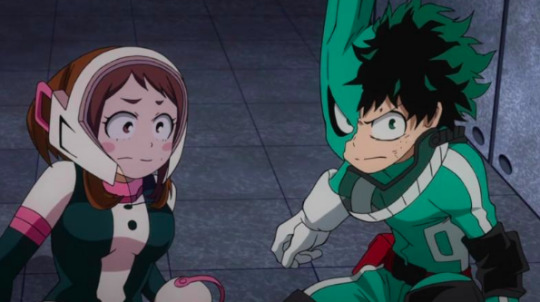
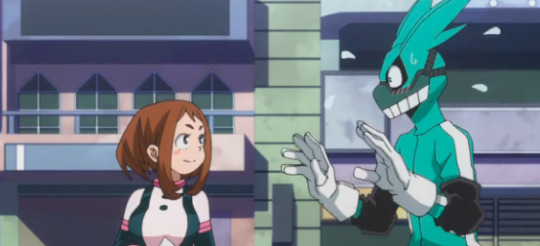
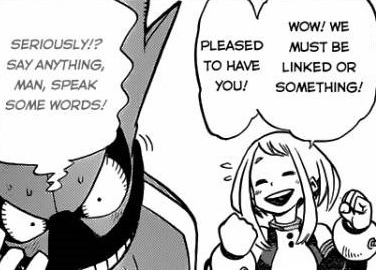
From: Episodes 7-8
What Happens: Deku and Uraraka are teamed up to fight Iida and Bakugo. Uraraka is very reassurring to Deku about their teamwork and at the climax of the arc, they work together to defeat their opponents in awesome fashion. Uraraka also goes up to Deku post arc with concern
Why I Like It: I do like me some battle couples. I love seeing Deku talk to Uraraka about his feelings (albeit for Bakugo) and Uraraka calling them a team and working hard because Deku inspires her to try harder. Deku showcases his scheming brilliant brain here too.
#9. Voting for Deku
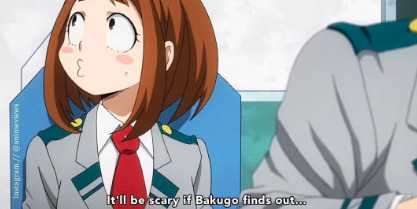
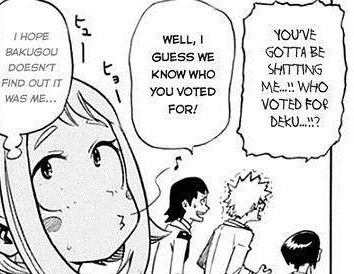
From; Episode 9 “Just Do your best Iida”
What Happens: The voting happens. Bakugo pitches a fit that two people voted for Deku, and Uraraka whistles while thinking “I’ll just keep my vote to myself”
Why I Like It: Uraraka voted for Deku, like Shoto did for Momo, and keeps it a secret. I’m hoping we get a similar scene to the Todomomo one where Ochako reveals this, though I’m not sure how that would play out.
#8. Someone you like
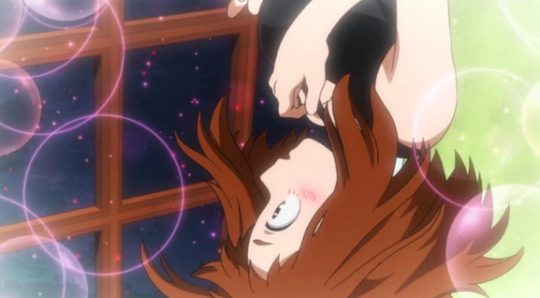
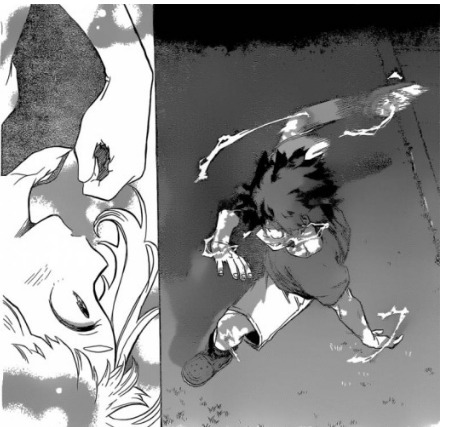
From: Season 3 Episode 15
What Happens: Uraraka, embarrassed about her classmates grilling her on her love life, floats to the ceiling - and sees Deku out the window practicing ultimate moves. She seems very smitten.
Why I Like It; This is a more pure Izuocha moment as she responds to him romantically, reaction to how cool he is and how much she admires him. I’m not wild about Mina telling Uraraka she likes Deku, but I do like he actually acting like she does.
#7. Cavalry Battle Teamup
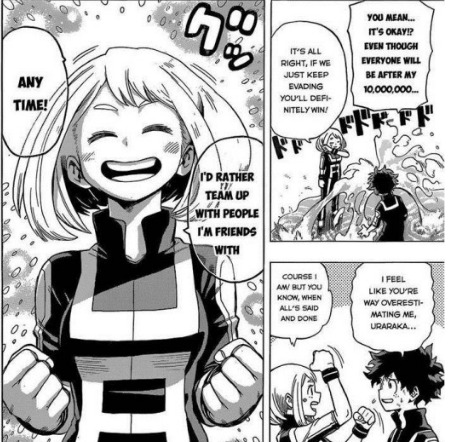
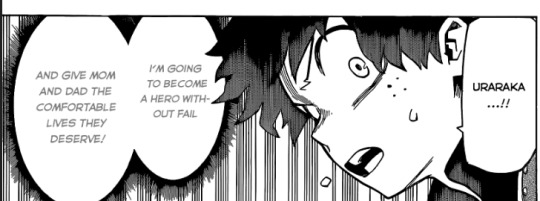
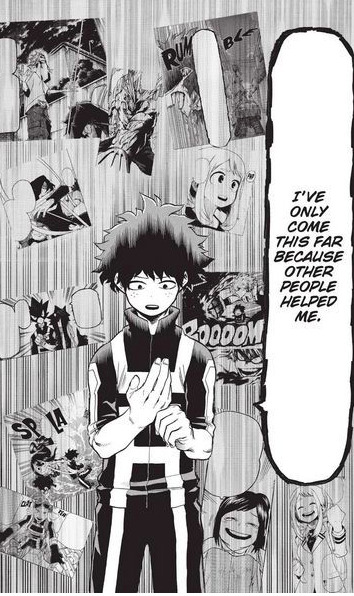
From: The Sports Festival Arc 2.04-2.05
What Happens: Ochako teams up with Deku in the Cavalry battle, hoping to as she later puts it “rely on him to get by”. She gets jealous of how much attention he pays Mei. Deku thinks about her support of him and all she’s done for him as he fights hard to win.
Why I Like It; This is actually more of a Deku on Ochako moment, since she later complicates her own role in this with her admission about Iida. But Deku says that he wanted her for his team, and thinks how cool she is, and is inspired by her support of him to fight Todoroki. It shows how much he values her support.
#6. Joint Training Arc Teamwork
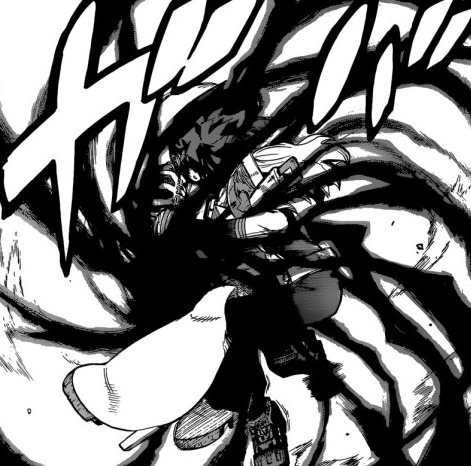
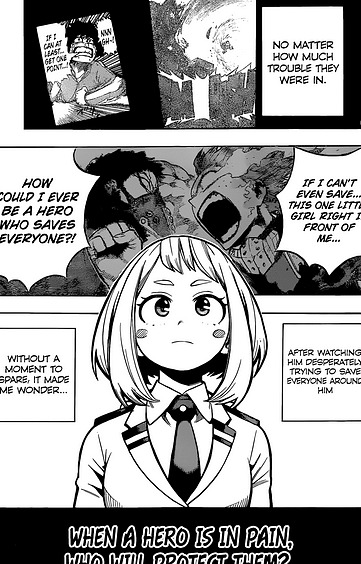
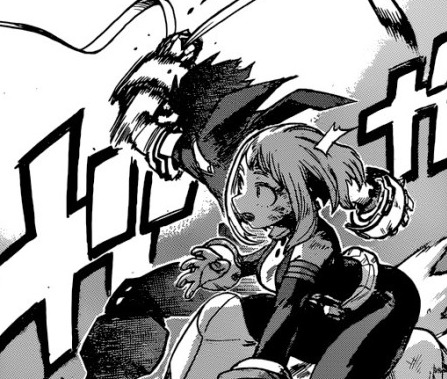
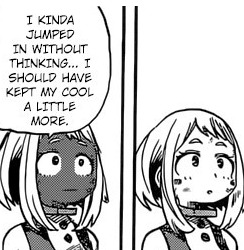
From: Chapters 209-216
What Happens: Deku and Uraraka watch each others’ backs in combat. Uraraka saves him from his powers gone mad, hugging him to calm him down. Afterwards she blushes about it, and he possibly blushes too though it’s not clear.
Why I Like It: Again, love some teamwork pairings. I wanted a little more from this arc (Uraraka talking Deku down instead of Shinso) but we still got her hugging him and blushing about it while thinking about her new “who saves the heroes” motivation. Deku is also grateful to her for saving him. Uraraka works well with him, worries about him, but now she doesn’t let it distract her.
#5. First Meeting and Rescue
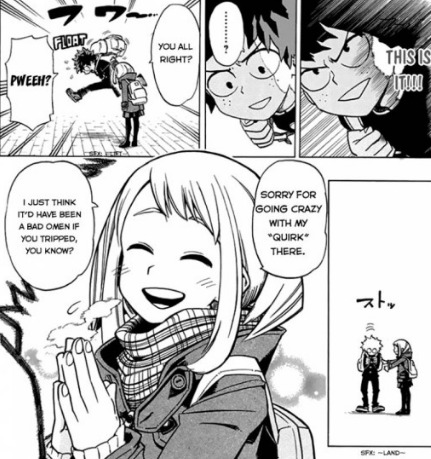
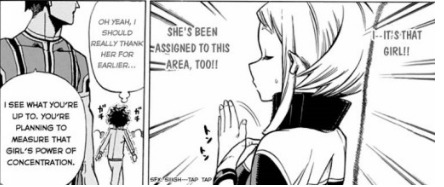

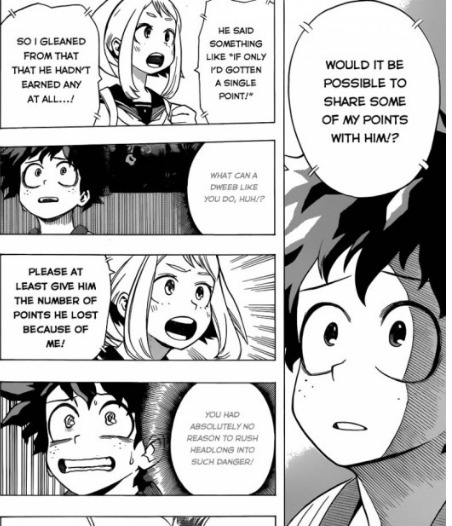
From: Chapters 2-4
What Happens: Uraraka saves Deku from tripping over his feet. Deku is attracted to her; she gets trapped in the fight and Deku saves her. This gets him into UA. She also offers him her points to Present Mic.
Why I Like It; It’s such a sweet first impression. He thinks she’s cute (she finds him plain, which annoys me - someone call Deku pretty before the series if over.) He saves her, she saves him, she offers him her points, he thinks about how she helped him before and tries to go talk to her. I like how he compares it to saving Kacchan from the sludge monster too - saving Uraraka is put in the same category as saving his lifelong acquaintance, despite having just met her.
#4. Deku means you can do it
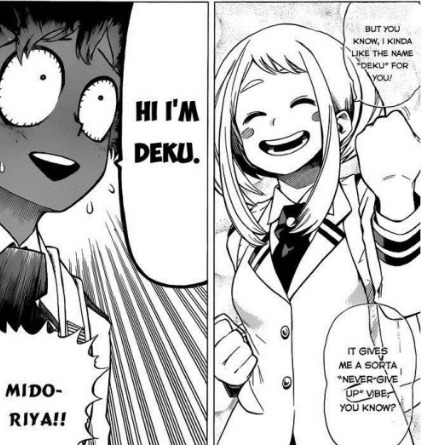
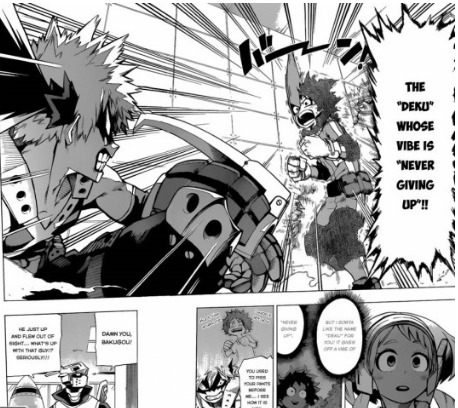
From: Episode 6 Rage you Damn Nerd
What Happens: Uraraka greets Izuku as “Deku” based on Bakugo’s name. Izuku corrects her but she suggests Deku could mean “you can do it.” Izuku immediately changes his attitude on the name. Later that ep he takes her name as his “you can do it” motto, which she finds touching.
Why I Like It; The Deku name is one of my favorite Izuocha bits. I love how she gives his nickname a new meaning and he likes it, takes it for himself, and finds strength from this support. (Of course, this is one of many moments on this list that some how also connects with Bakugo. There’s a lot of subtle parallelism between Ochako and Kacchan, probably since these three were the first three characters designed for the series).
#3. Giving her a plan

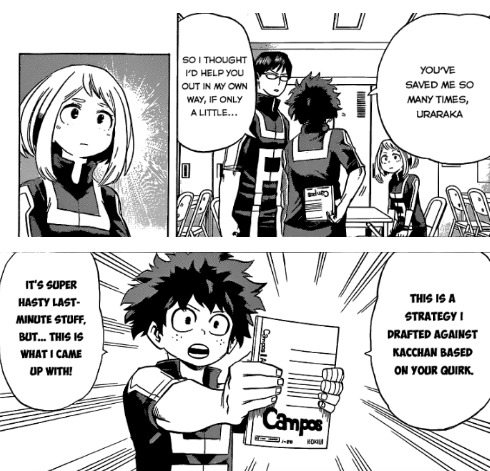
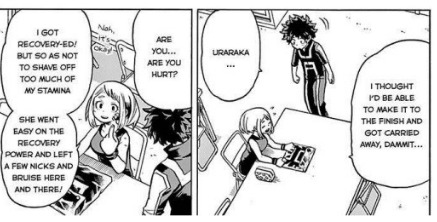
From: Season 2 Episode 8 Battle on challengers
What Happens: Deku notices how upset Uraraka is before her match and offers her a scheme to use against Bakugo. She declines and heads out to her match; post fight, he comes in to comfort her and is touched again by her support.
Why I Like It; Deku noticed she was upset! He offered to help her, wanting to support her like she’s supported him! He roots for her and admires her techniques, corrects Bakugo about her hard work, and tries to be there for her when she loses. She’s so sad about her loss, and I wish she’d cried on his shoulder instead of shutting him out - one day, she will, I hope.
#2. The real Uraraka
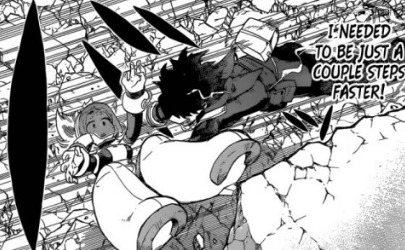
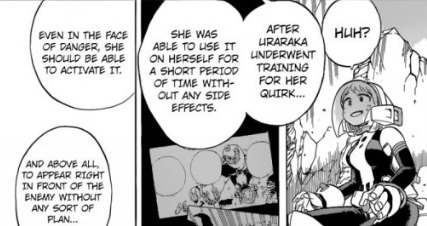
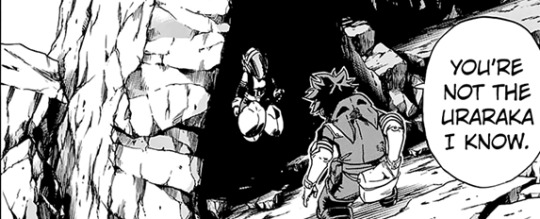
From; Shiketsu High Lurking 3.16
What Happens: Deku, while fighting Camieraka, recognizes that she isn’t Ochako. He runs down all of Uraraka’s features and why Camieraka can’t really be her.
Why I Like It; Deku shows here that he actually knows Uraraka pretty well, understands her, knows what she would never do and guesses that Camie was impersonating her. I like when people show they know their dates - once again, he knows her by now to the same degree that he knows his lifelong acquaintance Bakugo (in S1’s BTA he also knows Bakugo’s techniques in the same manner). I like that kind of familiariity.
Extras
Movie
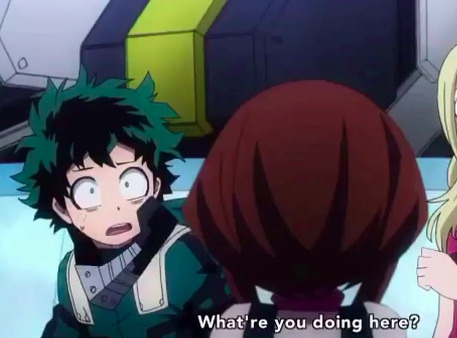
Filler
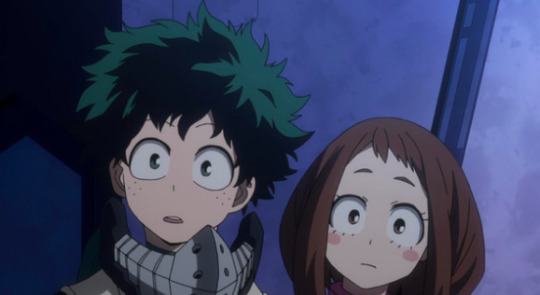
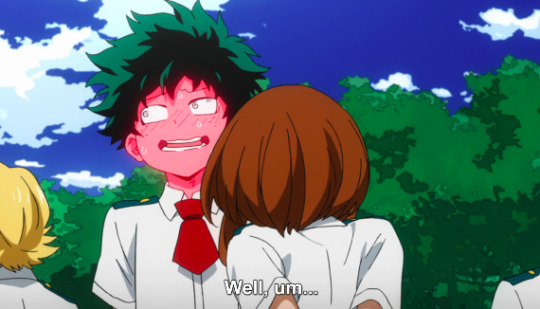
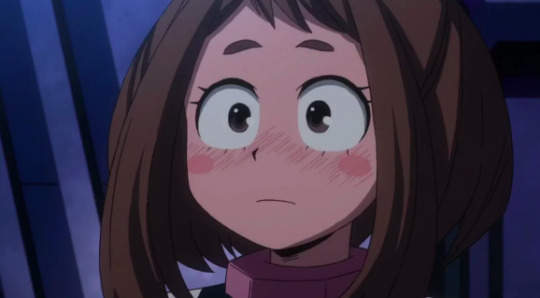
#1. Deku, that has to be my codename
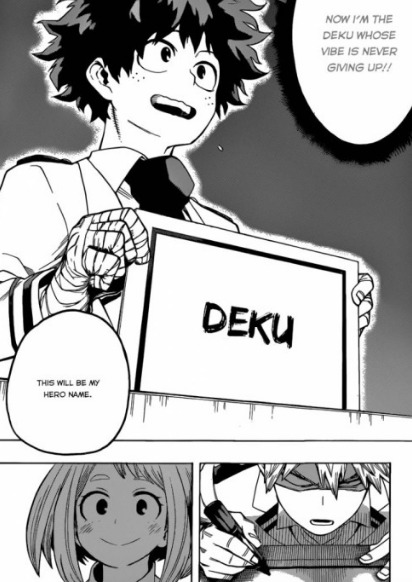
From: Season 2 Episode 13 Time to pick some names
What Happens: Midoriya picks Deku as his hero name, explaining that Uraraka made him see it in a different way, and smiling about it. We see Kacchan and Ochako both reacting.
Why I Like It; This simple scene is my favorite Izuocha moment, because I love how much the Deku name means to Midoriya. It’s kind of a motif among friendships in the show, this “picking your hero name” thing, and while Bakugo did come up with the name, Ochako gave it its new meaning. I like seeing them happy.
Top 5 Least Favorite
#5. Putting those feelings away
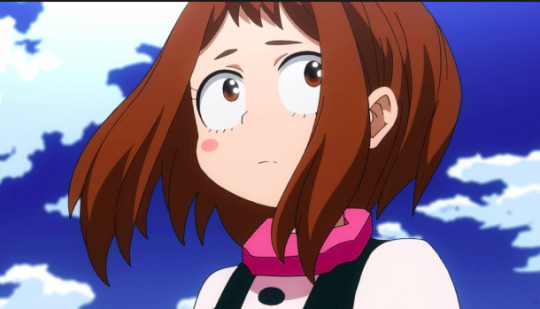
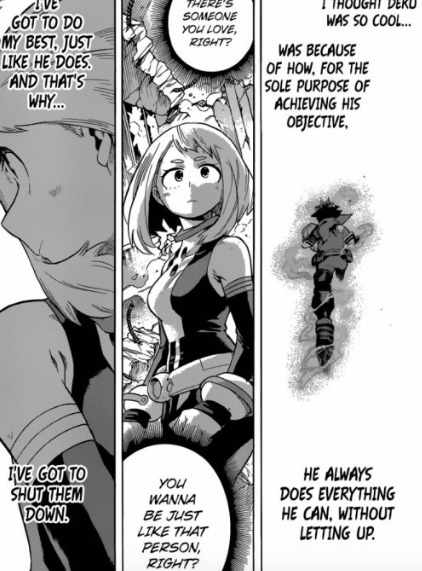
From: Provisional License Exam Arc
What Happens: Ochako decides to put her feelings for Deku away instead of acting on them in a little monologue.
Why I Didn’t Like It; While I’m glad we get to focus more on Ochako being a badass, as a shipper I found her decision frustrating. It just makes no sense that she can’t just tell Deku she likes him, date him and be happy. All that buildup doesn’t seem to be leading towards anything but delaying the inevitable. I find it really annoying when series up off the inevitable get together till the end just because it’s expected.
#4. Running away at the mall
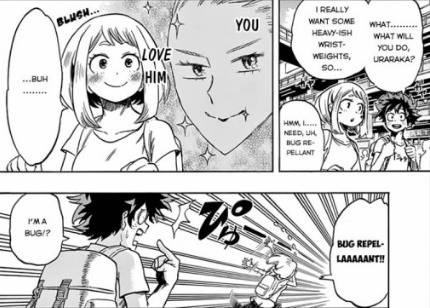

From: Season 2 Episode 25 “Encounter”
What Happens: Ochako, left alone with Deku, runs away yelling about bug spray. He gets attacked by Tomura while she freaks out about her feelings.
Why I Didn’t Like It; Well for one, we miss a chance for them to hang out one-on-one. Two, Uraraka indirectly calls Deku a “pest”, hurting his feelings. Three, we juxtapose her feelings with Tomura nearly killing Deku. Forth, she finds the idea of liking him so scary and off-putting, and this becomes her story for the next two arcs, which I find annoying since it just repeats the same thing over and over again.
#3. Because you like him?
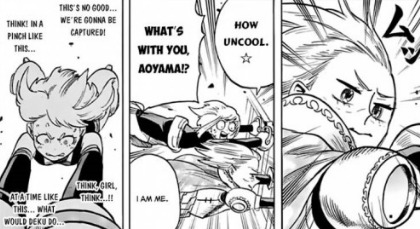
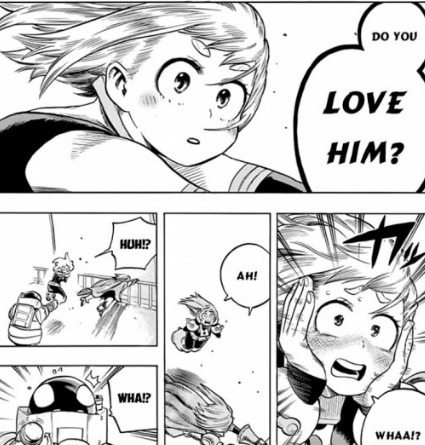
From: Final Exam Arc
What Happens: During their fight with 13, Uraraka is thinking “what would Deku do?” Aoyama asks Uraraka if she likes Deku. This freaks her out and nearly gets her killed.
Why I Didn’t Like it: I don’t get why Aoyama did this. Why? What was he thinking, why ask this during their test, why does this lead to Uraraka beating 13, why was this the way we made Izuocha canon? I don’t get why Uraraka’s crush on Deku has to be something other people tell her she has, can’t she just figure it out for herself? Aoyama what is your deal? I legitimately don’t get what Horikoshi was going for her.
#2. Hey jealousy
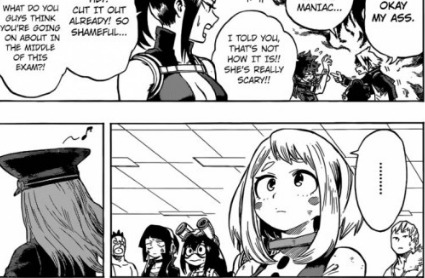
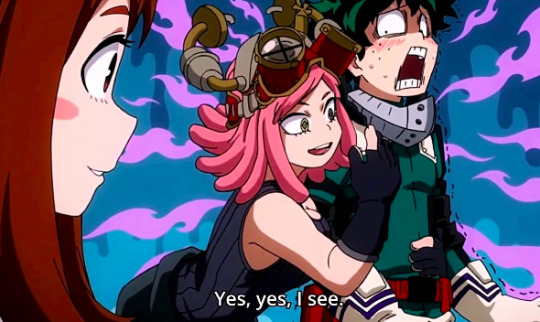
From: Various
What Happens: Uraraka freaks out when Deku gets near Mei, Melissa, and Camie, burning with Jealousy. Most recently she punched herself in the face for doing so.
Why I Didn’t Like It; I didn’t mind the first time with Mei, because it was Deku complimenting Mei, or Melissa in the film. But the other times, Deku is getting felt up and creeped out by invasive girls who scare or harm him, and Uraraka reacts by getting jealous of him, instead of trying to defend him. Try flipping their genders and see how disturbing it comes across. Like a “Nice Guy” getting mad that his crush is daring to get felt up by other men. Even if she says it makes her uncomfortable.
#1. Himiko Toga’s monologue
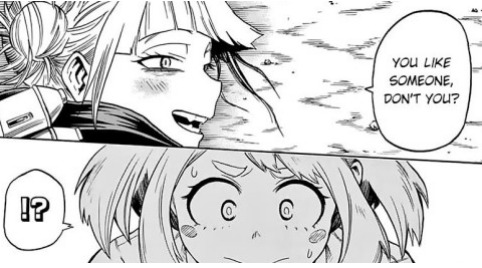
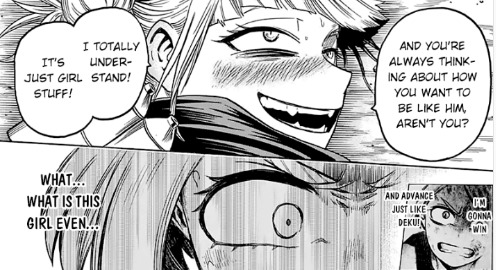
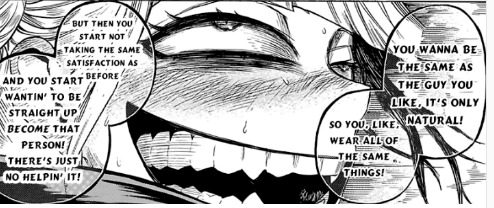
From: Training Camp Arc
What Happens: Toga recognizes that Uraraka likes Deku and creepily tells her that she has “her smell”, that they’re both obsessed with copying and replacing their boys. She later says “a great deal of faith is placed in you”.
Why I Didn’t Like It; Toga is Uraraka’s evil foil. If liking Deku this way is Uraraka’s flaw, that places a really negative spin on Izuocha. It makes it seem like liking Deku is only going to lead Uraraka down a wrong path and make her fall. Why? Why does her main romance have to be something that apparently scares and hurts her? It’s Deku for crying out loud! He’s a sweetheart, he likes her, they get along. This implies that Uraraka’s feelings for Deku are similar to Toga’s for Stain - she wants to kill and replace the person she admires. Also, the “trust in you” line sounds like blatant Traitor-Uraraka baiting, like that line in her bio about there being no “hidden side to her”. I love Toga, I love Ochako, I want them to be great foils, but I don’t want that to be in a way that makes Ochako’s romance look creepy.
So that’s my thoughts - read my meta for the whole story. I ship it but I want the story to start handling it differently.
211 notes
·
View notes
Text
Washed-Up Stucky MNF/Fic Writer Provides Endgame Opinions

I’m going to try to tackle this linearly, at least to begin with:
I am very much Team Bored With MCU Hawkeye, but I want to give sincere props for the cold open, which I think accomplished several things simultaneously: recapped the consequences of the last film (since, hey, it’s been a fuckin while), set the tone, and began Clint’s narrative arc.
That said, jesus, I’m still irritated by the shoe-horned family to begin with. First they were invented for convenience and narrative stakes, and then their final, ultimate reason for existence was to be temporarily fridged. Take a moment to imagine a world where Clint was the circus runaway loner he was supposed to be, who only had his coworkers as found family, who either responded to The Snap by throwing himself harder into his teamwork work OR went rogue because his sense of justice and agency was so fucking destroyed by what happened. He didn’t need a blood family to have the arc he had. And he didn’t even need the arc he had. But this is a bitchfest about a choice made many years ago, not made in this final movie.
The first third of that movie was rough. The whole thing had the narrative flow of “A Series of Related Short Stories Played One After the Other”, but the first third seems to be Failing To Establish the New World and then Clumsily Establishing The Emerging Situation.
The establishing shots and scenes to show the audience what The Snap’s consequences were worldwide were... lacking. It’s dark? No more baseball? People are relying on natural light instead of interior lighting, but this is also happening at Avengers HQ, where they clearly still have power and internet access to work their tech, so... was it just an aesthetic choice? I feel like the film tried to spend time showing us what the consequences were for the average New Yorker, but instead we get a weird Canonly Gay Russo Character who gave a good performance that tells us about the human loss but not about the mechanics of this new world. We get the ‘no baseball’ shot and all we get afterward are ‘people miss the missing people’. But restaurants still exist? Businesses are functioning? (Wouldn’t New York run kind of smoother if it wasn’t overpopulated?) I feel like we were invited to start thinking about how this dystopia works, but were never given answers. (There are so many interpretations of how things could go wrong if certain people just disappeared, and their knowledge/access were suddenly unavailable, and none of it was explored, even briefly, outside of establishing shots.)
The Garden Planet - it’s discovery, the traveling to it, the fight there - lacked emotional grounding in a way I find hard to explain. The audience was excited for Brie Larson being a fucking boss, and the quick execution of the grab-him-and-cut-his-arm-off plan was satisfying, but the twist and subsequent letdown was just a weird beat after a slog to get there, after waiting on a deep letdown beat from the last movie.
Last thing about flow and emotional beats, because I want to move on to character analysis, and this is a huge one for me: Clint’s fight in Tokyo and Steve’s fight with himself were some of the biggest missed opportunities in the entire film.
Not counting the football field brawl at the end, which I don’t count as a real fight scene, these are the two major fight scenes of the entire film and as far as I can tell, there was no effort made to make these showpieces. They went to the trouble of bringing Clint to Bladerunner Central, and pit him against the last bastion of aesthetic-obsessed mafia in the world. The panning camera in the interior as Hawkeye fought goons brushed past lazy fight scenes that only showed who was winning, not the brutality that Clint was supposedly falling into, not the grit of this new awful world, just... shapeless dark bodies getting thrown through windows? And on top of that, they could have made up (or picked from canon) any Big Bad to pit him against outside in the street, and we get an Orientalist sword fight that could have fit in nicely on a CW superhero show, and some of the most unnecessary exposition dialogue I have ever heard. Someone bothered to weave Clint’s arc in earlier, with Rhodey explaining to Natasha that Clint’s gone International and also Worryingly Dark. Why the fuck do we have the ‘I’ll give you anything you want’ line, on the rotten cherry on top of ‘stop being mean to the yakuza, we didn’t start it’? You already covered his motivations with the cold open.
And while Steve’s fight ended in a FABULOUSLY HEARTBREAKING WAY, the fight itself was nothing - you can pick little character details out like how they both ditched their shields almost immediately, and it was funny that Then-Steve mistook Now-Steve for Loki in the first place, but it was still a completely lost opportunity to get one true superhero battle in this three-hour slog. Both Steves could have gotten up and carried out the rest of the narrative after a decent brawl, but instead they fall a great distance after some blocked shots and it... was nothing? Missed opportunity for some cool shit.
Okay, skipping to character assessments now:
Clint’s character has been mishandled from the beginning and this seemed to be the “better late than never” eleventh hour arc. Except the end of the arc is unclear - it made sense for him to fall apart after losing his Shoehorn Family, but how did Natasha’s choice to fall do anything but fridge someone else, with more agency this time? It makes Natasha noble, which she already was, and it made her win against Clint, which I appreciate, but Natasha didn’t need salvation through death and Clint learns nothing by getting them back, just experiences relief.
Bruce. I want to say, first, that I love Hulk in a Cardigan. Cardihulk can stay. I want fanart, I want t-shirts, give me all of it. But Bruce’s explanation of “I scienced it so I could get the best of both worlds” only gives us half of the acceptance that Banner’s character is already working towards. As we saw most explicitly in Ragnarok, the Hulk isn’t just a physical form, he has his own separate consciousness, originally defined by rage but revealed to be more complicated. Bruce merging into Cardihulk seems to have... erased Hulk’s separate consciousness without merging it into himself? If there had been some acknowledgement of a second voice still within him that shot out opinions or demands for certain menu items in the diner, this would have been a much cleaner end to his arc, which has been equally messy between actor and narrative shifts.
Speaking of Ragnarok... it’s time! Are you ready? Have you read articles about the Gambit Gambit too? Are you fucking depressed that a fat suit was used for comedy gags in the year of our lord 2019? Because I was. The Russos seemed to... not struggle with what progress Ragnarok had put onto Bruce and Thor’s characters, but reject it. This movie’s Thor was anxious for laughs, was desperate for easy answers to a a feeling of lost heroism, and it didn’t feel like a familiar character. The time-travel scene with his mother wrapped it up very elegantly, and was well performed, but that scene didn’t need to follow a series of “chunky drunk in sweatpants” jokes to show us that Thor was struggling. Everyone in the film is fucking holding on by their fingernails, but only one is played for cheap laughs.
At least we get the bisexual Asgard lady king we deserved.
Tony got the right death. He got a hero’s death and Pepper’s last lines of “you can rest now” were exactly the right lines to wrap up an arc characterized by fear and a desire to protect and control at any cost. I knew the MCU was never going to really acknowledge that Tony’s The Problem, even with lines like ‘you should have let me do the fascist robot thing, that was gonna work fine’ thrown around pretty much as soon as he touches down on earth again.
I’m not sure if there’s much to say about Natasha. It was fitting that she was running HQ, that she was struggling, that she was rejecting emotional help from Steve but clearly still close with him. Seeing her break down after hearing the report on Clint felt right after, I think, being told by several directors (or making the personal acting choice? idk) to just be as flat and as decolletagey as possible. And again, while I feel like she would be self-sacrificing on that cliffisde if given the opportunity, and that she would win, the narrative choice to place her there and have that be her end didn’t really give her anything she didn’t already have. She had nothing to prove.
I have a hard time really laying out my thoughts on Steve without launching into the pregnant absence of Bucky, but I’m going to try. Chris Evans did a good job being the emotional heart of a really fractured story with a lot of conflicting pieces. Seeing him lead a talk therapy session after The Snap seemed very out of character for him until one realizes that Sam isn’t there to lead it himself. His scene offering help to Natasha was another good scene between them proving that not every m/f relationship has to be sexual to be interesting or add to the plot. His leadership speech during the Stupid Fucking Slow-Mo Heroes’ Walk to the platform was well done and makes me think of what could have been for the MCU, if they’d ever just let them be a cohesive found-family team for twenty minutes and let them fight some doom-bots or something. Fuck. Imagine.
Something weirdly satisfying about the deceitful ‘hail hydra’ line in the elevator. Yes? Yes.
The hammer scene was satisfying to me without being too gratuitous, but I’ll acknowledge that some people weren’t into it. Having paid more attention to Steve’s arc than most, I’ll argue that he earned it several times over.
His ending - that is, the secret life he alludes to but doesn’t explicitly reveal to Sam - is earned too. I’ve read at least one thing saying that Steve’s arc was all about him learning to let go, but that’s... never what Steve does. Not at the end of any arc, of any comic story, does Steve let go. Not of his principles, not of the people he loves, he is always “Thinking... Thinking About Bucky!” and getting in fights he can’t necessarily win. So I don’t think his final ending is ever Learning to Let Go. I think it’s fair that it’s Just Once, Just This One Time, Getting What You Want And Getting To Enjoy It.
And now I’m backtracking to Bucky. I’ve read one article already that theorizes that Steve’s arc, which was highly prioritized, included literally as little direct interaction with Bucky as possible because... the MCU? the Russos? Marvel?... is aware that Steve/Bucky is the most popular same-sex ship in the MCU. And that’s tiresome as fuck but I think there’s some truth to it. I wonder if, like in Civil War, we’ll hear later from the actors that a lot of contextual one-on-one scenes were shot and then mysteriously cut from the final edit.
I will say that in my head, Bucky is relaxed when Steve goes back in time for the final time, and lets Sam goes to talk with Steve one-on-one at the bench, because Bucky is not worried if Steve will come back, and does not feel a need to check on Steve on the bench. Because, like Peggy, Bucky has been getting secret visits too. Maybe as far back as during his time in Wakanda, but certainly since the final fight with Thanos. Bucky was calm because he already knew. He didn’t miss Steve because Steve hadn’t given him an opportunity to do so.
d
37 notes
·
View notes
Text
NaLu analysis: Context, Substance, and Chemistry

Many FT readers find, one way or another, multiple moments that showcase the strength of NaLu and highlight their chemistry.
However, not everyone is capable of perceiving how the story nourishes this relationship, not only by means of obvious moments but also by the context of several scenes.
This is one of the reasons why wankers are prone to ignore or completely disregard context to fabricate something to make implausible premises (cracks) seem as solid as a semi-canon pairing.
For example, some use the following scenario as a sign of a rising romantic relationship: the female lead slaps a character she and her partner are familiar with because he trash-talked the values the guild stood for, something that hurt her a lot.
Granted it was all an act and the guy apologized at the end, but the slap and apology are still overhyped by wankers as something as big as what NaLu may offer.
However, when this scene is put in the context of what Lucy’s character was going through, the story points in a different direction.
The scene was painful to Lucy because she was struggling against the fear of the FT guild, which she considers her family, not coming back, and having a member of that family bad-mouthing the guild only confirmed her fears... until it was revealed that was all an act. And this isn’t just speculation; right after everyone returned, Lucy expressed to Natsu, Happy, and Wendy this fear she had

But the context also offers something else. Let us ask, what gave Lucy the strength and hope she needed to, at the very least, fight this fear?

Instead of “what” we should ask “who.” The answer? Natsu, who not only provided Lucy with the hope she needed in a passive way. He also took action in response to her desire to get the guild back together and brought her to an adventure to reunite their scattered guildmates.
Again, this isn’t mere speculation. Natsu worked in the idea of getting the guild back together right after this scene:
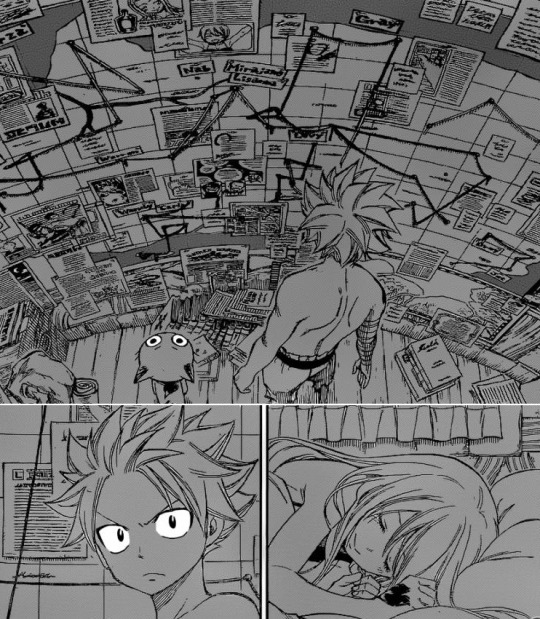
While not explicitly romantic, these actions are far more meaningful than an overhyped slap/apology.
It’s safe to say that this element is quite unfriendly with less likely premises. Still, context not only refutes non-sensical arguments, but it also enhances NaLu moments when factoring it into the equation.
For example, the movie storyboarded by Mashima himself, Dragon Cry, features a moment previously analyzed in another post. The moment by itself looks strong, but it’s the context that further solidifies the scene as “NaLu.”
At the beginning of the story, we get Natsu asking Lucy in a curious manner “What do I look like?”. This line will be repeated at the end in the form of a "meaningful echo" as Natsu beats the bad guy with a new transformation (which made him look more like a dragon and less like a person for a while).
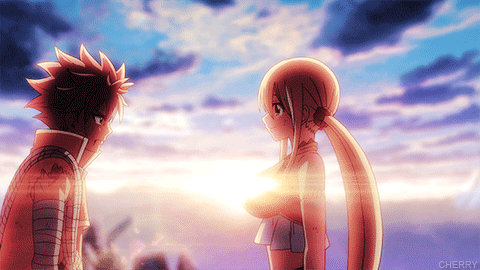
So, the context now gives the scene a deeper meaning as it shows how much Natsu values the perspective Lucy has of his person and how it affects his character the way she sees him.
More often than not, context allows readers to grasp the substance of a relationship and, in some cases, even individual characters.
On the other hand, there’s another underrated element many either disregard or misinterpret. It is something we already considered in an earlier post, but given how wankers try to twist this concept to downgrade NaLu, we’re going to touch this subject once again: Chemistry
As we explained before, many readers can admit NaLu has several moments throughout the author’s works, but wankers or haters still deem this bond as something lacking in “real chemistry.”
Some of you probably read my previous “rant” before and realized, one way or another, wankers promote arguments to say “implausible” premises can easily match what NaLu has. And one relatively new argument relies on the claim of certain cracks having “real chemistry” while NaLu doesn’t have any...
Does this claim hold any merits?
Short answer: No. Logic and evidence refute such arguments
First, let us consider the term “chemistry” once again. To truly understand this concept in the context of literary works we need to what true chemistry is not
True chemistry is not about commonalities. Usually playing the straight man or woman in crazy situations doesn't automatically makes you a match for someone who may do the same.
True chemistry is not about saving the girl or getting rescued by someone. A typical advice about writing chemistry indicates that it should never be implied that a character owns the other a relationship because of favors done. Saving the girl is not enough to claim a pairing has the "superior" chemistry.
Now that we cleared that up, we can answer the question: What is chemistry?
In the context of relationships, chemistry is related to mutual trust/faith; it’s a natural connection, "a bond, or common feeling between two people." In fact, "real chemistry between characters happens when they affect each other in big ways."

So, we can measure chemistry, not by commonalities, not by the characters' overall intelligence, but by how the moments they share leave an impact. When meaningful gestures and significant moments result in an emotional attachment.
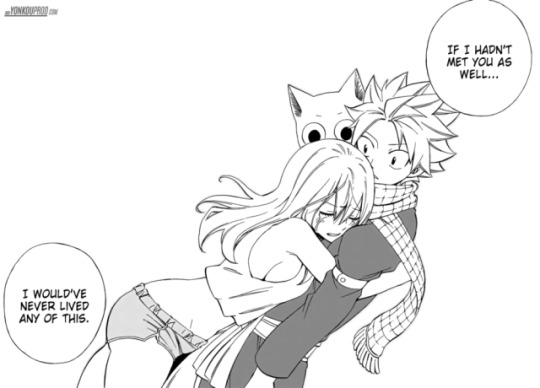
But, despite all of this wankers may insist on their premises being just as solid as NaLu. What do they use as “evidence” for this claim?
The first thing many of these shippers tend to use is a “Freudian Slip” to prove a Mr. Fanservice character is seeking a romantic relationship with Lucy. The line goes something like this: “She’s kinda cute.”
Does NaLu have something better than that?

He deemed Lucy as “precious” to him as he battled the one who killed Lucy’s future self. His tears along with his actions made his words far more meaningful than a mere “Freudian Slip.”
Another moment that wankers may use involves this setting: Lucy powering through a great deal of danger and pain to save Natsu’s life with the assistance of the guy wankers promote as her would-be lover.
Does NaLu have an answer to that? Yes! All thanks to the context
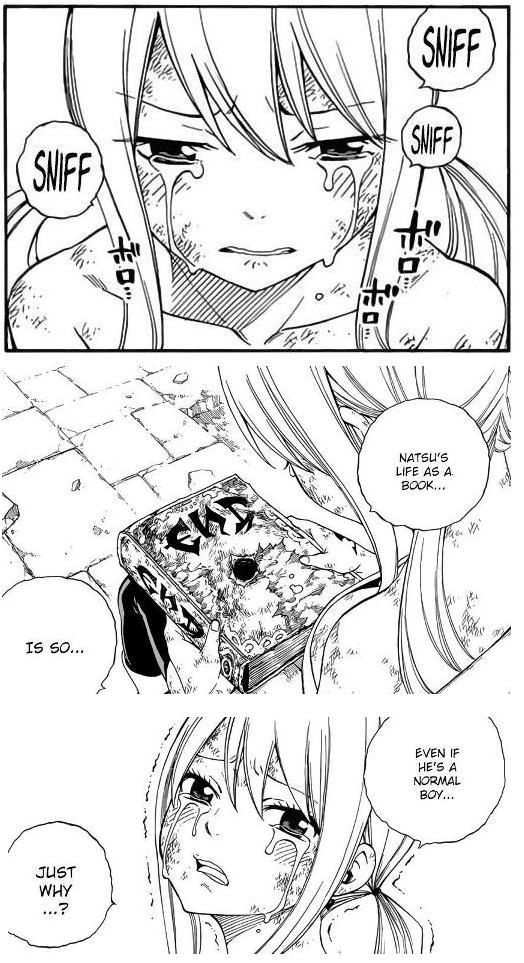
The epicenter of Lucy’s emotional and physical struggle is Natsu and his potential fate after releasing him from the one thing that ties his life to Zeref’s existence.
What wankers used to justify their premises in this point of the story, turns out to be more supporting evidence of the strength of Lucy’s bond with Natsu when we factor context!
All that these shippers have left are very occasional “saved the girl” scenes and a few displays of “concern.”
We already mentioned how the reasoning “saving the girl means she owns her savior a relationship,” doesn’t match what a natural chemistry between characters should be. But, for the sake of debate let’s consider these moments anyway.
Wankers use these few showings to claim their favored character should get the 1st spot in Lucy’s heart. Because he shows “concern.” Doesn’t Natsu show a lot of concern for Lucy?
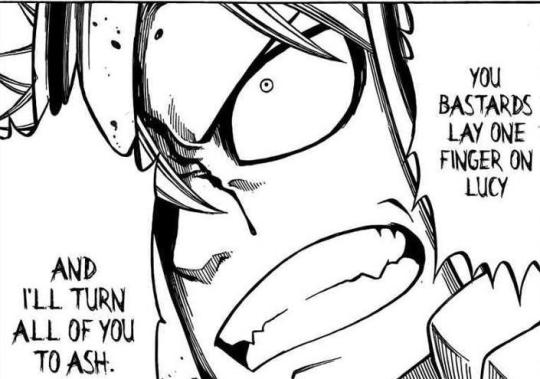
He’s pretty open about it and displays “concern” for her pretty often too, sometimes becoming hard to contain when it comes to the prospect of saving/protecting Lucy
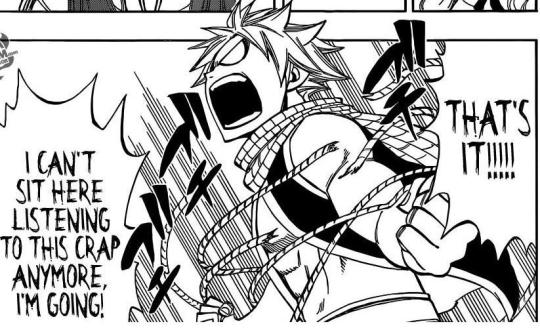
So, if “concern” is the factor to claim a guy should be the girl’s lover/boyfriend/husband, then why wankers hype other characters over Natsu?
What about “saving the girl” scenes?
Natsu protected and saved Lucy...
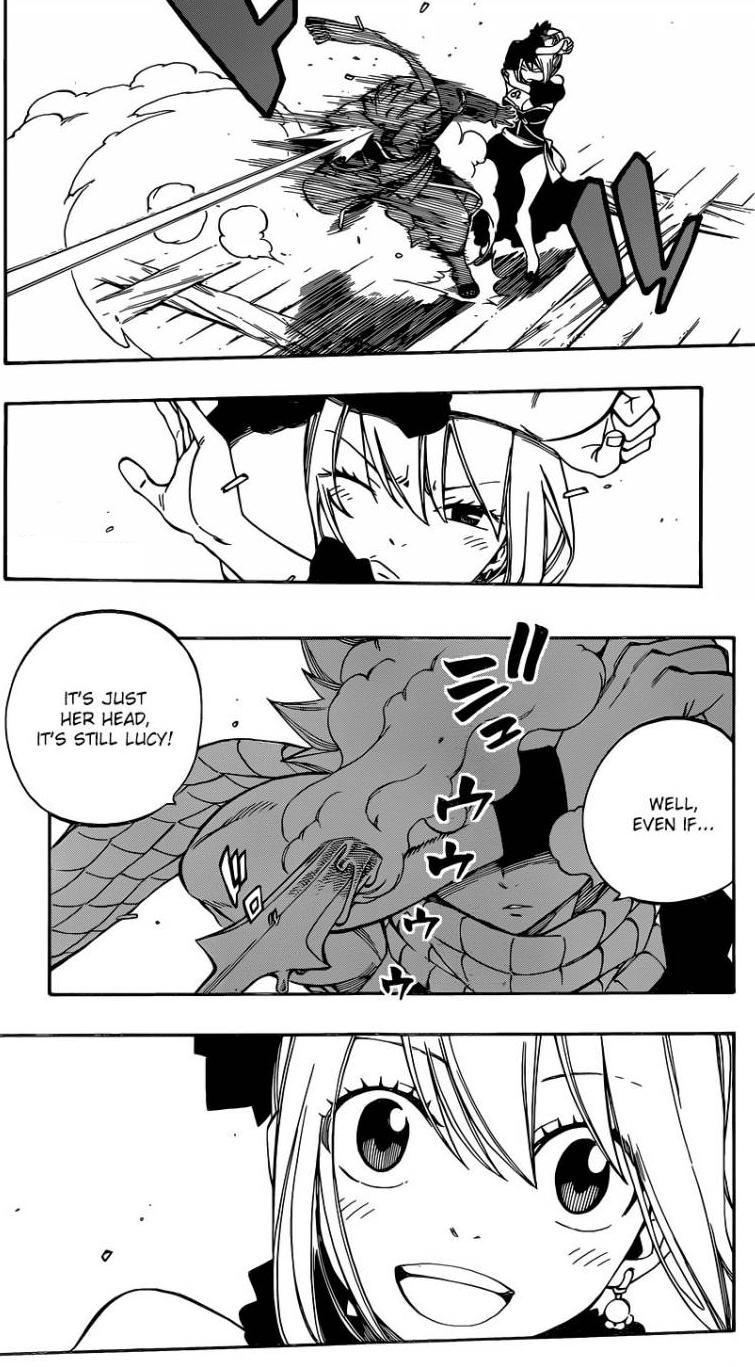
...multiple times
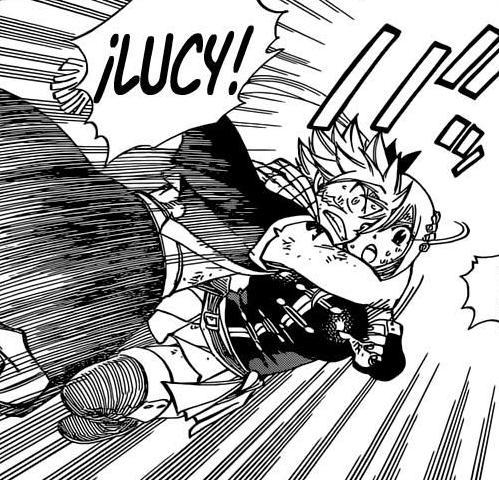
If saving the girl = we’re a thing now, then why wankers still say their favorite option is the one who has the romantic relationship with Lucy instead of Natsu?
When all arguments are exhausted all that remains is one overhyped instance of Lucy teaming up with a cool sexy guy to parry several sand projectile attacks and claims of “wonderful friendship.”
If teamwork is a factor, then why the “most compatible team” as stated by the manga doesn’t get the same hype?
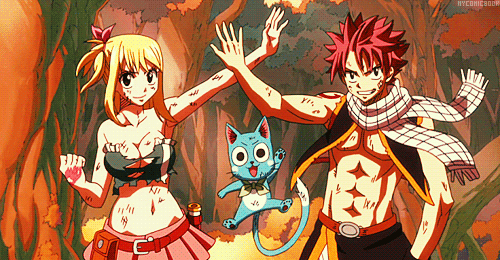
When analyzing the author’s works, we can see Natsu and Lucy displayed how well they worked together several times
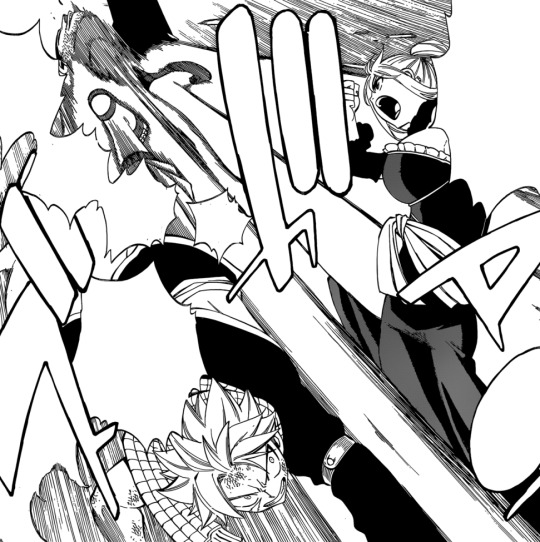
When it comes to their relationship, in a previous post we also considered how their companionship and their potential to become a canon pairing can easily be described as “wonderful,” or as Lucy said: it’s always more fun when we’re together
At the end of the GMG arc, we could see how their bond, the “common feeling” between them could transcend time and space
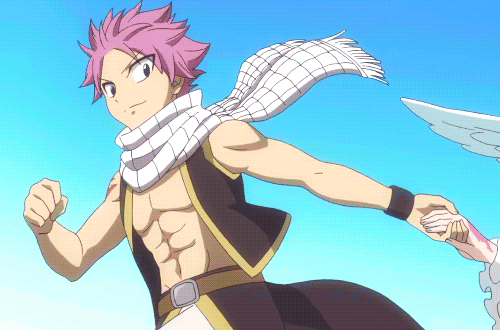
So, why cracks are the ones deemed as “wonderful” while NaLu gets discarded?
The point is that even when several shippers claim the “saved the girl” scenes from their favored premises hold more merit, NaLu casually matches and surpasses the best they have.
This comparison is not meant to imply that saving the girl cannot be used to advance or enhance the romantic potential of a relationship. Some stories may resort to such a trope to build particular bonds, but what makes such scenes stand out is the context.
For example, one of the first NaLu moments seen in the series is when Lucy gets rescued by Natsu during the Phantom Lord arc. NaLu benefits from this scene not because Natsu was saving Lucy, but for the overall context of her situation...
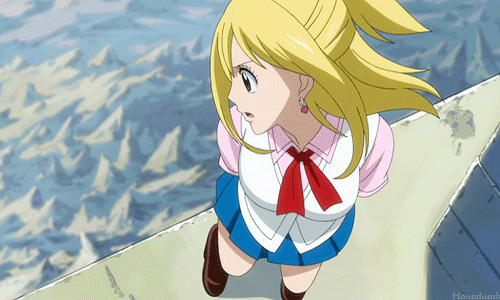
...as some readers may realized by now, hearing Natsu’s voice as all that Lucy needed to jump off, taking what we could consider a “leap of faith.” This scene helps to stablish a great trust that’s growing between the characters involved.
It becomes even more meaningful when considered as part of a much bigger whole; this “whole” being the progression that created the emotional attachment that Natsu and Lucy share for one another.
Still, despite everything we’ve seen in the author’s works, even some NaLu shippers use this flawed logic to throw Lucy to the bed of a “better-looking” character or having her marry someone “cooler.” All while keeping Natsu, in the case of those who still remember he’s there, as the “other guy.”
This little exercise is meant to illustrate how, even when playing with some particular shippers’ “rules,” NaLu remains as the choice that makes the most sense and has the better chemistry. Unlike what some wankers/haters may say or think, NaLu is more than just a bunch of lovely fanarts.
Some shippers may disregard Natsu as the logical option because of his personality. He’s a good-hearted thrill-seeker; someone upbeat with a fondness for pranks and collecting mementos, as well as someone who’s prone to let out his emotions.
Several shippers don’t find such traits attractive or “worthy” of Lucy, while they favor the archetype of a stylish Mr. Fanservice character who has a cool, calm, and collected personality.
But, a potent relationship is not about what shippers consider “worthy” or “best boi.”
A potent relationship is about meaningful gestures, multiple impactful moments, consistent bonding, and a solid emotional chemistry.
One last thing to consider is this little detail: Some wankers decided to use the cover of chapter 379 not only as a sign of their crack being “semi-canon” but also as a tag for their premise.
When a hater tried to use the cover to attack rival shippers, even casual readers laughed at how delusional was claiming that cover contained anything that could support a pairing.
Then again, if we play by these wankers rules, we could mention two little pieces made by Mashima himself that when put together give us a pretty obvious message:
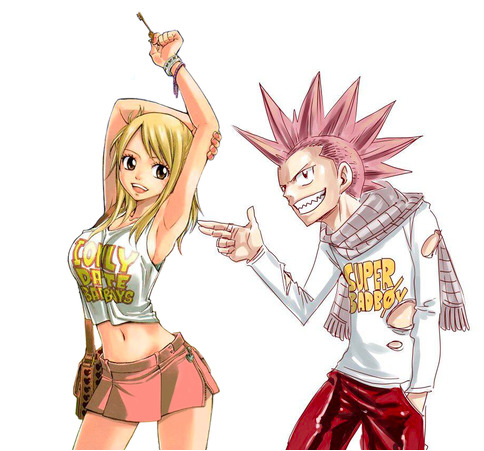
And as that MJ song says: “Who’s bad?”
#fairy tail#fairy tail dragon cry#natsu dragneel#lucy heartfilia#natsu x lucy#nalu#otp: it's always more fun when we're together#defending nalu#chemistry#potent relationship#potent pairing#logic#analysis#recently edited
560 notes
·
View notes
Text
Arc V Anniversary Day 23
Day 23: Favorite duels:
I absolutely love Yuya's rematch against Jack in the Friendship Cup. There was so much buildup for this duel throughout the Synchro arc, but the conflict between the Tops and Commons getting more heated with both Shinji's rebellion and Roger's constant attempts at taking control of City made it more intense than I would have expected. Having Yuya and Jack duel to stop the fighting was such a great idea and really fits with Yuya's goals of ending the dimensional war, as well as becoming a great Entertainment Duelist.
Jack was pretty upset when Yuya was still trying to imitate his father's dueling and was rather blunt about Yuya's relying on his father's words, but I think that was because Jack feels so passionate about dueling and was upset that Yuya hadn't realized the problem of trying to mimic his father on his own. To be fair, Yuya had used his father's dueling style as a coping mechanism, as well as an attempt to reach his dream, for so long that I don't think it would have been realistic if he had figured out the problem on his own, especially when Yuya was dealing with a lot during the Synchro arc. He was frequently doubting himself, questioning if he was strong enough to stop the dimensional war and he would get depressed whenever he dealt with a major setback. I think that Jack was the only character who could have made Yuya realize that imitating Yusho wasn't the solution too. All of Yuya's friends and families knew Yusho and admired his dueling as well, so I don't think that they would see the issue of Yuya being like Yusho as someone like Jack was. He didn't see it as Yuya trying to follow in his father's footsteps. He saw it more as Yuya just using Yusho's dueling as a crutch.
I really loved how Jack helped Yuya to realize that he did have his own way of dueling the whole time. He was so focused on trying to be like Yusho that he never thought of how to be like himself, which is quite fitting given Yuya's emotional problems throughout the series. He realized that Pendulum summon was his own voice. It felt like a continuation of his lesson from Shuzo as well. Due to that match, Yuya understood that he didn't need to be the only Pendulum user in order to stand out among the crowd. He could still stand out as an example to other Pendulum users as the one who first opened its door. Thanks to Jack, Yuya realized that Pendulum summoning is part of his own way of dueling different from what he learned from Yusho and how he could use it to make his own kind of dueling style different from Yusho's. I especially liked the message behind Yuya's strategy as well. Most of the monsters he Pendulum summoned were weak compared to Jack's Tyrant Dragon but by coming together, their attacks, and thus their voices, had an impact. It was a good message that fit with Yuya's dueling style, as well as with the Lancers all helping to stop the fighting throughout the City during this match. I also really appreciate that they didn't have Yuya disregard his father's dueling in order to find his own. Yusho had such a huge impact on Yuya's ideals and goals that I don't think he could have realistically found a way to duel that wasn't influenced by Yusho's Entertainment Dueling.
The entire duel was just terrific from start to finish. There were so many great moments for Yuya, the Lancers trying to fight back against the riots was cool and Jack finally found an opponent who he could go all out against when he summoned Tyrant Red Dragon Archfiend. But that last turn was simply beautiful. After all of the struggles Yuya went through during the season, the entire City was cheering him on. Everyone was fully engaged in this duel and many wanted to be as close to it as possible during its final moments. The people of the City announcing the last attack alongside Yuya was so wonderful. It showed how much both Yuya and Jack's passion had affected everyone in the City. Jack openly accepting his defeat with a smile was just so fantastic. He was happy to finally found a strong opponent that could force him to reach new heights. I was so happy during this last turn when I first watched the episode that I was near tears. Even now, just thinking about the duel and especially that last turn can make me quite happy. Yuya's dueling being able to affect that many people was just so touching and it really showed that his dream of ending the dimensional war wasn't so impossible. It is my favorite duel in Arc V, as well as one of my favorite duels in the franchise.
I also really love the battle against Zarc. It is technically one long duel with different opponents every episode, but it gave the remaining Lancers a chance to shine. Sora's desperate plea to get through to Yuya was so tragic and I still think that Ed's disappointment that Yuya was so far gone that he wouldn't react was still pretty sad. Shun and Kaito had some nice teamwork during their attempts at defeating Zarc. I liked that Shun was focused on both Yuya and Yuto. I thought that they had developed a nice friendship during the Xyz arc. Kaito didn't interact with Yuya as much, but he did respect him after what he did for Heartland as well. Gongenzaka's efforts to protect Jack, along with those flashbacks of the years he, Yuya and Yuzu spent in Standard, all in the hopes of getting Yuya back was truly touching. Jack saying that he would drag Yuya out of Zarc's soul himself is still one of the most fitting ways for Jack to say he cares about someone. Crow's attempts to remind Yuya what he did to help change the City was sweet and even Sawatari tried to remind Yuya of their match in the Miami Championship. Reiji used the monsters from his first duel against Yuya as well and was positive that Zarc using Pendulum meant that Yuya still existed in him. Most of these characters had really good and believable connections with Yuya. It was touching to see that saving a person that they cared about was their main priority. They obviously didn't want Zarc to destroy the world again or for the four dimensions to merged, but I think focusing on saving Yuya gave the duel more emotional and personal stakes involved than if it was just another save the world kind of conflict.
I especially liked how Zarc became more emotional with each match. He barely reacted against Sora and Ed, started to laugh and smile more against Shun and Kaito, reacted to Entertainment and Steadfast Dueling against Jack and Gongenzaka and lashed out in anger when Crow and Sawatari pointed out that he was afraid of losing. This helped to make him stand out more than if he was a more typical hammy villain right from the start. I think that this also made the notion that he was afraid to lose more believable. He went from being fully of arrogance and confidence to anger at this accusation, but it felt like a natural progression given how each match affected Zarc to some degree. There was also a lot of great tension in these matches. Zarc was defeating every remaining character, Yuya was no where to be seen, we didn't know what happened to the Bracelet Girls after they had become Ray for awhile and the dimensions were closer to merged together with each episode. It just helped to make the duel more engaging to watch when every character from each dimension that fans grew to care so much about over the course of the series was in danger.
While I liked the duel from the start, the twist with the En Cards is a huge reason why it became one of my favorite duels in the series. Seeing that all of the monsters Zarc had already destroyed ended up defeating him once Ray and Reira showed up was just amazing and changed everything about the duel for me. The Lancers weren't just defeat fodder used only to hype up Zarc. That was part of the reason for these duels. After all of the buildup Zarc had and knowing that he is the big villain of the series, he needed to defeat strong opponents to back up that buildup and to establish him as a huge threat. But seeing that the En Cards required at least three monsters of the different summoning methods in the graveyard to activate showed that those duels weren't just to hype up Zarc or stall for time. Even Leo's attempt at defeating Zarc helped out in the end. Ray already defeated Zarc before, so she and Reira would have been able to do the same if they were Zarc's first opponents, but given that the dimensions were close to merging together, it would have been pretty difficult for them to pull that off within a short amount of time. Having the other duels allow for Ray and Reira to activate the En Cards really worked. It allowed for everyone to help defeat Zarc, while also having Ray deliver the final blow after they established that only she could defeat him. Instead of having the Lancers just be defeat fodder, this allowed for them to actively contribute to Zarc's defeat. It showed that these characters, their connections to Yuya and their efforts to save him all mattered in the end. I loved the twist at the time, but it's also one of those aspects of Arc V that I just love and appreciate even more over time as well. It's really a terrific duel and easily one of my favorite ones in the series.
5 notes
·
View notes
Text
Villain | Hero in Pursuit | Hero Pursued
I got this ask when s6 aired and gave an abbreviated response because I had way too much irl stuff going on at the time. But that didn’t stop it from haunting me- there’s a lot to unpack and really it could be answered in a large series. I marked it to follow up on, and so here I am, up two whole brain cells, a bottle of tequila, and an ill advised deal with a devil later... following up on it.
Anonymous asked: Just a thought... something I think we can only say after [season 6]: so S1-2 the villain was Zarkon, and the arc sorta ended up being Zarkon v Shiro. Then 3-6 would be Lotor, so Lotor v Keith. I guess it makes sense to think now that the next arc would feature Haggar v Allura? Also I was thinking there's some space there for Sendak v Shiro too. Thoughts?
Voltron: Legendary Defender is easily divided into (3) 26-episode acts, and each act is marked by several storyline transitions, perhaps the most noticeable being the changing of primary antagonists. As pointed out, each villain has been pitted against specific persons on our hero team, but this show has more complexity than a simple 1-for-1 opposition can provide. In VLD, each villain is matched with (2) heroes- one hero who leads the charge and actively pursues the villain, and one hero who is being pursued by the villain as a means to an end.
In Act 1, Zarkon spent his efforts and resources pursuing Shiro and the Black Lion, but Allura led the charge against him. She called the team to action, trained and prepared them, and determined what the paladins knew of Voltron prior to entering the fight. Allura set the team’s initial overall goals and established the idea seen throughout s1+2 that “defeating Zarkon” equaled “winning the war.”
In Act 2, Lotor was introduced as the main villain and new leader of the Galra Empire, during which Keith led the obsessive pursuit against him. But after Lotor’s adversity to Zarkon became known, he gained audience with Team Voltron and began winning their favor primarily by pursuing Allura. In conversations, he most often addressed her rather than the group, speaking to her of Altea. Of transforming the Galra Empire, healing and saving the universe. Of rebuilding the coalition her father started. Not to say Lotor was disingenuous in all of this, but he pointedly sought Allura’s favor using terms he knew she understood and identified with in order to sway Voltron to his side. And it’s only when Keith returned at the close of Act 2 with hard evidence of Lotor’s wrong doings (against Alteans) that his spell was broken.
And in Act 3, Honerva has been set up as the main antagonist; so following this trend we may expect Keith to be the hero pursued and Shiro the hero pursuing.

Of course, this isn’t likely to play out how we’ve come to expect, particularly given the first half of Act 3 featured Sendak. While he certainly fits into the villain category and was a centerpiece of s7 in a way which pushed him past the combination secondary and arc villain he’d previously been, it’s important to remember Sendak was first introduced as Zarkon’s agent and later reintroduced as Haggar’s puppet. It’s important to remember Honerva plays both direct and indirect games.
Hero pursued- Keith has been on the edge of Honerva’s storyline since s1 when he fought one of her druids, Macidus. Later in s2 he battled more of her followers alongside Thace, and in s4 he was going to destroy her ship’s shield during the battle for Naxzela. And as of s6 Honerva has started returning Keith’s phone calls. First and most significantly by sending clone!Shiro to finish him, but also in 07.05 The Ruins with Macidus’s return.
Granted most of these are not considered direct plays, but Honerva typically operates from a distance, setting pieces into motion in ways which make her hard to track. Additionally, Honerva now knows a great deal about Team Voltron and their interpersonal dynamics in a way which she has, and undoubtedly will again, manipulate.

Hero pursuing- Keith and Honerva’s dynamics are subtle, but hers with Shiro are not. We could argue Honerva has been the real villain all along, that Zarkon was a red herring, that Lotor was / is not in opposition to the team, that Sendak was just a distraction. And Shiro has been tied in with her every step along the way.
When first abducted by the Empire, Shiro was interrogated by Haggar’s druids. She took his arm, outfitted him with his first prosthetic, and credited herself his fighting prowess in the arena. After Shiro’s escape and Voltron’s return, the first robeast she sends to fight them is one whose defeat earned Shiro his title as Champion. And the first time we see Haggar fight someone head-on, she’s fighting Shiro.
She has manipulated, battered, and used him, going so far as to make him the center of her slow burn take down of his team. But in s6, we follow Honerva’s trek through Oriande through clone!Shiro, implying their connection, their power struggle, is mutual. That Shiro is capable of returning what Honerva deals out.

This is not to say the rest of the team won’t be involved in Honerva’s undoing. Just as Keith had a hand in Zarkon’s arc and Shiro in Lotor’s, Allura will be a big part of Honerva’s arc. Which is critical because Allura is the only one to have caught Honerva with her pants down,, way back in s2’s finale. That’s not to be forgotten or taken lightly- it’s seen with Shiro, Lotor, and a myriad of others, people do not win against Honerva, they only ever lose badly or come to a draw. But Allura, prior to the majority of her character development, went toe-to-toe with the witch and won.
It’s going to take more than a single hero can do to save the universe. It’s going to take Keith’s instincts, Allura’s alchemical abilities, Lance’s perceptiveness, Hunk’s compassion and clarity, Pidge’s intellect. It’s going to take Shiro’s ability to unify and inspire.
VLD is about teamwork, not one person saving the day. Shiro has many strengths- as a fighter, a leader, a survivor, a diplomat, and a strategist. But he cannot win this alone. He came into this story a formed young adult, already having undergone great struggles and personal discoveries, already having achieved greatness. His development was never going to manifest like the rest of the team who were inexperienced and have made obvious leaps and bounds.
His development has been subtle- Shiro’s greatest asset, his ability to bring people together, has been inhibited by his inability to rely on them. It’s seen with Adam and in parts with how he related to his team, Shiro put ‘the mission’ before relationships and was always prepared to rely only on himself. His need to maintain control and his instinct to shoulder burdens alone weighed him down.
Which is why Keith saving Shiro, in s7 and across the whole show, is so important- it’s how Shiro has grown. Theirs is one of Shiro’s few relationships we see which pre-dates Kerberos, and it has not only survived, but has thrived. At the onset, Shiro poured a great deal into connecting with Keith for the express purpose of helping Keith, not himself. Shiro expected to gain nothing from this, and yet Shiro is alive because of this bond. Shiro is stronger because he made and fostered a connection with someone who repeatedly and unfailingly covers him when he falters.
Shiro is stronger for relying on his team. The team is stronger for having endured together. Voltron is stronger for it all.
This pursuer / pursued arc has been repeated a few times now, and with each new twist in villainy Team Voltron has come closer and closer to working as a unit, as a team. And Sendak’s defeat, their victory for Earth, represents a significant shift in the narrative, because this is the first time this group worked clearly and cohesively together across a long, large-scale battle. And this is due considerably to Shiro’s growth into someone who can not only unify, but can rely on his team.
When Shiro faced Sendak in s1 they fought to a draw. But Sendak came out on top because his team was there to intervene and forced Shiro to yield. Shiro was strong, but alone. Later Shiro tried to interrogate Sendak (again alone) and was shaken to his core which caused him to falter and left viewers with the sense Shiro has inner demons to overcome.
Because that’s how this trope is supposed to work- The hero fails the first time they face their big bad, spends the majority of their story growing, facing smaller enemies, working themselves back up to the big boss fight. And that’s what happened with Sendak- nevermind Honerva is actually Shiro’s big boss fight
Shiro and Sendak’s fight in s7 is a mirror parallel of their first fight. Seasons later the pair are still evenly matched, but this time Shiro’s team is unified and Sendak is alone. Where he discarded his team, literally used them as cannon fodder, Shiro built rapport with his, protected them and trusted them to play their roles.
Keith delivering the final blow against Sendak was not him stealing Shiro’s hero moment.
Keith delivering the final blow against Sendak displayed Shiro’s growth into someone who unifies and relies on his teammates.
Keith delivering the final blow against Sendak underlined, bolded, italicized, and highlighted THE IMPORTANCE OF TRUST AND TEAMWORK.
The point is that teammates, friendships, close relationships, are to be fostered. Are to be protected. Are to be valued. Loyalty is strength. The point is it’s important to have people you can trust to fill in and cover where you cannot. Because that is how they are going to save the universe.
#and this is why im not upset over shiros s7 arc#but if you do believe shiro didnt have incredible moments this season#just wait#it should be clear by now that just when if feels like a character isnt getting enough#or is getting 'robbed' of their moments and screen time#their real moment is just around the corner#shiros is coming#and its with honerva#who has no chill#shes either so silent you forget shes exists#or shes dropping from the sky to eat your face#honerva#shiro#takashi shirogane#keith#keith kogane#sendak#sendaks demise#season 7#voltron#voltron legendary defender#vld#meta#theory#allura#haggar#vld.schematics#season 8 got me like#vldgen#friend sheith
196 notes
·
View notes
Text
REVIEW // RWBY | 6.12 | “SEEING RED”
AKA love.
Welcome in to my review of Volume 6, Chapter 12, entitled, “Seeing Red”.
In this episode: One fight becomes pointless. Another fight ends.
Deep breath, everybody.
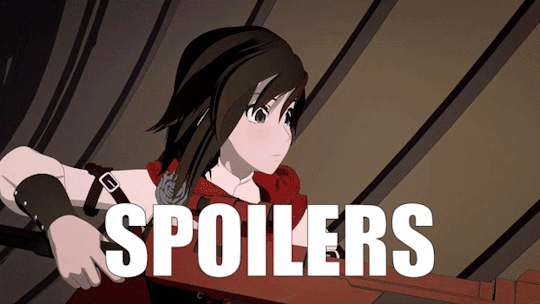
ONCE MORE, WITH FEELING.
As someone who was watched a lot of episodic stories, be it web series like RWBY, or an anime, or western television, I can say that one of my favourite experiences is seeing a long-term storyline come together and hit its climax.
I don’t write this to suggest that the culmination of Blake and Yang’s story is the best thing I’ve ever seen – who knows what that even is, after all these years? But it’s still really damn good, and the definite standout of a great episode.
You know, the story of Blake and Yang is one defined by demons, both internal and external – even going back to Volume 2, when an insomnia-riddled Blake spent ages jumping at shadows and snapping at her teammates until Yang was finally able to snap her out of it.
Of course, it undoubtedly took off at the end of Volume 3. One girl losing an arm and the other fleeing in the dead of night will do that for a storyline like theirs. Between then and now, Blake has spent two seasons embroiled in the Menagerie uprising and at times clearly has avoided reflecting on what happened with Yang. On the other hand, Yang was left alone to confront trauma and disability, and eventually had to deal with reuniting with Weiss, Ruby, and her estranged mother, with the thought of Blake very much on her agenda throughout. It’s an uneven divvying up of them time, to say the least. And while this season has teased great explorations of their relationship, those execution has been disappointingly limited to some flashes and the odd good scene here and there.
Not to mention that the primary spectre of the storyline, Adam, fulfilled the minimum requirements for a character of his kind without providing a whole lot of depth. At this point in the story – the penultimate episode of Volume 6, he solely existed to be vanquished and provide closure to this loop.
But even with those foibles, this is ultimately a story of the love between two people conquering the demons that threatened to rip them apart, and it manages all those requisite beats with aplomb.
The fight itself is shorter than expected, but constructed with enough efficiency that it doesn’t shortchange the viewer. Psychologically, it’s satisfying and consistent, calling back to some of Yang and Blake’s old moments of teamwork. I love the use of Blake’s broken sword as the thing that finally does Adam in. The fight dredges up the problems between Yang and Blake, correctly pointing out Blake’s abandonment and Yang’s past failure against Adam and everything that came as a result. And the story uses that thread to craft its conclusion; individually and as partners, Blake and Yang prove wrong Adam’s ideas of them, and beat him by affirming their bond. Lovely, that.
And this is just one half of a great episode.
It’s not that the conclusion to Gang vs Mecha Cordovin can match the other story for significance or action. This particular fight – and its fallout – is far more about establishing images to set up the finale rather than providing catharsis, but these images set up enough to have me very interested indeed in whatever is to come.
There’s Ruby diving into the barrel of the mecha suit’s cannon, all maturity and growth, disabling the weapon. And before that, standing up to the Atlesian zealot and speaking the real about the pointlessness of their fight, and shrugging off Qrow’s concern. It’s not as if she knows she’s absolutely going to win, either, but she knows there’s always another way to get where she and her friends need to go. There is Cordovin herself, someone who has let her grand proclamations and her desire for control obscure the true purpose of her presence in Argus. And while I feel that the sudden appearance of the Leviathan is a cheap way to create some higher stakes for a finale otherwise lacking in obvious crisis points (due to the mismanagement of the antagonists aside from Cordovin and Adam), the dynamic it creates with Cordovin’s delusion is one I really enjoy. And it looks pretty badass, stomping through the ocean like that. Reminds me a lot of Nier: Automata.
But now, we as the viewers know that Cordovin cannot be relied upon to deal with the new Grimm threat, right? Good thing a certain red-caped someone has been sufficiently built up to the point that she can just step into being the new Guardian of Argus in Cordovin’s place.
So, despite my issues with how the back end of this season has chosen to ignore much of the early setups, the season as a whole has been thorough and consistent with Ruby’s storyline, and it’s set to deliver right to the very end. And now the finale has a clear direction, something it’s been lacking up to this point. Take that, and add everything that Yang and Blake have just done? I would say there’s still plenty to feel good about with this season, and this penultimate episode did quite a bit to restore my positivity for what’s to come.
OBSERVATIONS
Ima discuss the particulars of that relationship here, because I don’t want to bog the review down. Some people may think it absolutely matters for the show to be more explicit in defining what now exists between Yang and Blake. And while I understand that argument on representation grounds, I do also subscribe to the idea that some bonds transcend explicit labels. Now, I will say that what these two now have is love, or something close enough that the difference is irrelevant, but personally, I feel that arguing over “romantic” or “platonic” in this case will just be pointless semantics, and ignore the clear and obvious beauty in how these two are depicted together.
I’ll discuss Ruby in greater depth with the finale. While there is plenty I could say about how this episode all but solidifies Ruby’s growth across this season, I have a feeling that another important chapter will be added to her story next week.
Goddamn, Adam got the sticks put in him. Huh?
That moment again: Yang catches another charged slash, and tosses Adam’s sword into the water. He goes after it, only to be hit with an out-of-nowhere uppercut from Blake. They both lunge for a piece of Blake’s broken sword; Blake gets there first, and Yang picks up the other piece. From there, it’s academic. This fight in its entirety has been very well-staged across the three episodes.
“What does she even see in you?” – Adam. I’ll just leave that line there.
For many years, I’ve been a Blake/Weiss shipper. If you’ve read my fan fiction, you know this. Since I stopped writing fan fiction, however, I haven’t really “shipped” any particular pairings. These days, I more or less just pay attention to what the show does with its relationships and do my best to explore them as they come. All of this is to preface my statement that I love how the show has built this relationship between Blake and Yang. In the early days of the series, I wasn’t a big fan of them together, just because Yang’s character was too thin for me to buy into the ship beyond a surface level. Of course, Yang has since gone on to become a fantastic character … it’s funny how these things evolve.
Cordovin paints an interesting picture of the “Atlas Superiority Complex”, doesn’t she?
I imagine that Yang and Blake won’t be asked to do too much fighting in the finale.
GRADE: A-
While reservations about squandered story potential remain and will likely persist beyond Volume 6’s conclusion, “Seeing Red” cleans up the trajectory of the season’s endgame and creates some interesting character-based action and drama for next week’s finale. It all but solidifies Ruby’s ascendancy as a heroine, and even though the reappearance of Grimm at this point smacks of lazy writing, it creates interesting stakes nonetheless. But of course, this episode’s strength is buoyed by the culmination of Yang and Blake’s long-running storyline. Emotionally satisfying as well as efficiently crafted, their final showdown with Adam is a beautiful affirmation of their bond and everything that has gone into it up to this point. – KALLIE
8 notes
·
View notes
Note
scarlet visions meeting the rest of the young avengers?
Hello! This one is quite a bit outside of my comfort zone as I do not write anything Young Avengers, but I’ll give it a shot. Side note: I did not include Vision/Jonas because, in my Scarlet Vision timeline/series I really have no firm idea how he would come to exist.
I hope you enjoy it!
“What do you think?”
Vision shifts his hips as he leans forward, heels tapping the side of the building they are sitting atop as he considers his wife’s question. The skirmish below has been persisting for almost twenty three and a half minutes, a time that is not unacceptable, per se, but also not impressive given the opponent is a low level necromancer with a small contingent of undead henchmen. He and Wanda could dispense of such foes in less than five minutes and forty five seconds (as the most conservative estimate) and that includes at least three brushes of his hand along Wanda’s back and one lost-in-the-moment kiss (they’re signature move, or so they have been informed). “They are a bit,” the sheer variety of flashing colors due to the powerful attacks is disorienting from up here, so he imagines it is far worse on the ground, which could be contributing to the overall fight, “discombobulated.”
“Yeah, they aren’t working together, like,” Wanda releases her grip on the thermos of hot chocolate, the air this high frigid, only part of the reason they are snuggled close, his cape and arm wrapped around her, and points a finger at the fight, “Tommy keeps breaking from the group to run, he knows better than that.”
A habit their son has been quite insistent on not breaking, even with various lessons of teamwork in the backyard. “I believe that could be slightly contributed to Billy working closely with,” the roster for the Young Avenger Initiative streams through his mind until he lands on the correct face, “Hulkling, perhaps Tommy is unable to apply our lessons to a group of three.”
“Billy does seem very comfortable with Teddy.” Her voice is identical to the way both Tony and Natasha would talk to him about Wanda, a long long time ago.
“I believe you set the rule we could not insinuate his relationship until he expressly informs us.”
Wanda bumps his shoulder, an action that requires barely any movement to be effective given their close proximity, “I don’t think they can hear us up here.” The hot chocolate hovers to her lips as they watch the continued attacks below, each action and movement unhelpfully independent from the others in the team. “Oh, Cassie’s growing.”
Stature, or so her file indicates is her preferred hero name, is gigantic yet again, but Vision cannot tell if the growth is strategic and purposeful or part of every hero’s experimentation (Wanda calls it a guessing game) with their newfound abilities. “Hawkeye has broken another window.”
“So when do we step in?”
Vision finds his shoulders rising and falling of their own accord as he runs through Captain Rogers’ instructions. “We were told to only intervene if there is a teachable moment, otherwise we must remain purely observational.”
“Well I’d say not working as a team is teachable,” something Vision wholeheartedly concurs with, “just have to wait for Nate to re-materialize from wherever he went.”
Iron Lad’s file is the densest of the group, a dizzying yet enjoyable puzzle Vision spent the afternoon studying, yet he still shares Wanda’s exasperation at watching the young man flicker and weave in and out of the fight. “How shall we proceed, once he returns?”
The thermos hovers again as her eyes squint, lips pursing in contemplation and the sight fills him with a comfortable, familiar warmth. “I say we go with a shield drop and then,” Wanda hums a little as she continues to watch the melee, body wiggling slightly while she cycles through the available attack patterns, “I’ll do a Scarlet burst while you take out the henchmen and we end with a Poltergeist.”
Her plan would certainly eliminate the threat, but, “That is quite dramatic.”
Wanda shrugs at this, “They’re more likely to remember something showy.”
A tactic they have occasionally fallen back on when training the boys, particularly for dull and repetitive drills. If they can demonstrate how the skill might lead to a full powered application, then the repetitiveness is suddenly deemed worthwhile. “Very well. Nathaniel is back.”
Vision stands first, hand reaching down to help Wanda up, her powers rearranging their observation tools into neat piles they can easily retrieve afterwards. Once Wanda is ready she turns towards him, the giddy grin on her face one she flashes him anytime they’re about to, in her words, kick some serious ass. She steps towards him, their bodies flush, a requirement of the maneuver, and her hands trace the vibranium clasp of his cape, “Remember, Maximoff, I’m not as young as I used to be.”
He wraps his arms around her waist, bending to place a kiss to her lips that accompanies his whispered promise, “I will be gentle.”
A synchronized, centering inhale and they exhale while stepping off the edge of the building, a scarlet concave shield forming underneath their feet, helping to even out the rush of air billowing his cape and her hair upwards. One minor turn of their bodies realigns them closer to the villain and that’s when he increases his density to speed up their descent, Wanda’s powers flowing more steadily in preparation of landing, and then, right at the last second, Vision goes incorporeal, depositing Wanda in a bubble of pulsating red on the ground as he phases through the cement. Based on visual data from their reconnaissance on the roof, he emerges precisely four feet from Wanda, hands phasing into the undead henchman within a millisecond of reappearing. In his periphery, as he phases and dismantles the lackeys, he can see the mesmerizing crackle of scarlet in the air and its reflection on the building, a technique meant to disorient a foe (and sometimes him, if he is not careful). Vision also intercepts chatter via his auditory processor some Wows a holy shit and then, a smile forming on his face at once again embarrassing his children, a plaintive and annoyed seriously from Billy and an unfortunate expletive from Tommy (which means yet one more lecture on language and perhaps mentioning the continued issue with Steve).
The density shifting assault continues until Wanda’s powers grow into an overwhelming frenzy, a long established cue for the next phase of the attack, the last henchman crumbling to the ground as Vision hovers, bringing his body horizontal and parallel to the ground. He flies directly towards his wife, phasing just as he reaches her, her body shivering at his passing through, and then he bursts from the cloud of scarlet, advancing on the necromancer and solidifying his body just in time to deliver a blow to the man’s chest, sending him backwards onto the ground. Scarlet ropes tether the man to the cement, Wanda sauntering up next to Vision, her hand dipping below his cape for a congratulatory squeeze, which kickstarts his body into an operantly conditioned response of turning towards his wife, his fingers tangling in her hair as he breathes in her essence, their mouths meeting and the world simply falling away.
Tommy’s irritated, “What are you doing here?” forces them to remember that they are here for a purpose.
A slow, easy step backwards angles Vision’s body towards the teens, their faces familiar from the files, their attributes and personalities clear in his head based on the stories the boys tell, but this is the first time meeting the members of the initiative. Half of them stand with arms crossed and perturbed stares, while the others form a spectrum from amused to curious to horrified (Billy, in this instance). “Captain Rogers assigned Wanda and myself to supervise your mission.”
Iron Lad, one of the arms-crossed cohort, and, from Vision’s understanding, the de facto leader, wades into the conversation. “Last I checked supervising’s not the same as intervening.”
“You are correct.”
Wanda’s hand brushes his shoulder, a tight smile on her face lets Vision know she wishes to handle the issue, and so he stops talking, acquiescing to her desire with a small nod. “We also had orders to step in if we felt you weren’t performing at your best.” She shrugs, it’s small, indifferent, but that is not the same as meek, the dismissive and authoritative tone of her voice setting the young heroes up to challenge her at their own risk, “You were nowhere near your best.”
The comment incites many displeased glares, a muttered bullshit from someone that better not have been Tommy, yet none of the young heroes immediately counter back. In the two second silence, Vision determines to utilize a softer approach meant to harmonize Wanda’s bluntness, a, as he has heard in the common lexicon, good-cop, bad-cop paradigm. “Why were,” Vision realizes they had not determined what to go by in the presence of Billy and Tommy’s compatriots, whether they remain causal with first names, go formal with Mr. and Mrs. Maximoff, or if they utilize hero names, for which his is no different than the casual but Wanda has some social distance. He determines to remain undecided and rely on pronouns and hand gestures to clarify the subjects of his sentence, “we able to subdue the foe far quicker than you?”
Cassie shrugs, gloved hand flinging out to the side to emphasize the obviousness of the response, “Because you’ve been heroes forever.”
A fair statement but not specific enough, so Vision tries the question from a more direct angle, “Though true, that is not sufficient to justify how we eliminated the threat in three minutes and thirty four seconds and you were unable to do so in the twenty eight minutes and fifty six seconds before our intervention.” The information might have a greater impact on them than Wanda’s prior words, if the increased gloom on their faces is an indication. “What actions did we take that differed from your own and thus contributed to our efficiency?”
“Listen,” Kate - or Hawkeye, as she has been passed the mantle from Clint, a surprise to everyone that it was not one of his own children to carry on the name (though that was a relief to Laura) - points her bow first at Vision and Wanda, “if I have to make-out with them,” the bow sweeps to the right to indicate the rest of the team, “to win a fight, I’m out.”
Sniggers follow her sardonic response, though Billy seems to be blanching at the turn in conversation, and then Cassie throws an arm over the archer’s shoulder, “You know I’m the best choice.”
“That,” Vision glances at Wanda, receiving an unhelpful shrug as the teens in front of them begin arguing over who would be the ideal makeout partner to end a fight, “that is not the,” the thing with having twin boys is that there is always arguing over which, sometimes, unfortunately, one must raise a voice to get attention back. What Vision failed to consider is the amplification of distracted chatter that would occur with numerous individuals of this age. “Wanda?”
A scarlet spark erupts in the middle of the group with a, “Pay attention.” The only two that look somewhat remorseful are Hulkling and Iron Lad, but at least the rest are quiet, mostly. “Making out has only ever won us three, maybe four fights. Plus,” a warning rings in her voice as Wanda moves her gaze across each of their faces, “only consensual making out during and after fights.”
“I-” Vision nods, trying to follow-up the comment but insteads cycles back to the original, “Yes, thank you. What tactical difference was there between your fight and ours?”
Being an Avenger has been Vision’s full-time job from his creation, one he has considered leaving, on occasion, but can never fully commit to such an enormous change. In this moment, with the silence thickening as elongated seconds pass and the group in front of him all seem interested in everything but him, he determines being a teacher is not in his future, his fingers growing antsy at the continued hush. But then Teddy meets his eyes, an unsure but hopeful smirk on his face as he raises his hand, “Yes, Hulkling?”
“Um, well, Vis- Mr. Maximoff?” At least he is not alone in his uncertainty of names, “Maybe we could have been more,” he lifts his hands, starting them far apart and swooping them until they meet, fingers clasped, “together in our attacks?”
Wanda sends them all a beaming, proud smile, “Yes, your teamwork and cohesiveness needs a lot of work.” Her arm loops through Vision’s, tugging him towards her until their sides are touching, “We trained over and over and over again on coordinated attacks, studied each others powers-”
A quiet, “And mouths,” comes from the archer but Wanda keeps moving without acknowledgement.
“It is rare that one person alone eliminates a threat.” She pauses, emphasizing the fact. “Figure out how to be a unit and you won’t have to be saved by us again.”
The words may sink in, they may not, none of the individuals in front of them betray their thoughts, until Iron Lad nods, lips arching downwards in thought. “I think we,” he turns to his teammates, “should go work on that.”
A chorus of sures and okays go along with the decision as the group starts to leave, Billy and Tommy hanging back, clearly torn between what to do, though Vision is not certain why. “So,” Billy interlaces his fingers while he haltingly proceeds with his thought, “can we go or do we have, you know, curfew?”
“I believe in this instance,” Vision mentally confirms his answer with Wanda before offering it to the boys, “you may be home later than usual.”
“Awesome.”
Once the boys are gone, the necromancer deposited safely in a containment cell awaiting a meeting with a judge in the morning, and they are back home, snuggled on the couch, Wanda nodding off on his chest as his hands work through her hair, he finally reaches a decision he had been waiting to make until he’d been able to process the evening. “They seem an admirable group.”
#scarlet vision#vision#wanda maximoff#billy kaplan#tommy shepherd#hulkling#cassie lang#iron lad#kate bishop#teddy#Young Avengers#the maximoffs#fanfic#mine#ask anon#seriously I don't really know anything about YA#so I hope this is somewhat accurate#this will probably be the last thing I write with the YA#thanks for the ask
69 notes
·
View notes
Text
Zoomen
((I’ve been meaning to talk about this since FOREVER @___@))
In the bonus manga “Rangers,” King (forcibly) introduces Saitama to Zoomen, a children’s show about a superhero group that relies on each other to defeat all their enemies. It’s played out like a comedy, but...the way King, Genos, and Saitama react to that idea--of relying on others when you need them--is really sad, because they’re responding based on their own not-so-wonderful life experiences. What makes it worse is that rather than offering a hopeful possibility of change, the end of the chapter only reinforces the most negative views of that kind of teamwork.
Like always, full analysis is under the cut <3
When King first talks about Zoomen, he says it’s an introduction to heroes and emphasizes that they get a lot of support from all angles--from each other, from having faith in one another, from an organization that helps them in their missions. He speaks about it fondly, with metaphorical rose-tinted glasses (or bubble-tinted, in this case), because that’s how he sees teamwork.

His career--his whole life--relies on the hope that people believe in him and have faith in his projected hero image, and that he’s going to get help when he needs it (which is a lot). King ended up a hero because other heroes came in when he needed them. It wasn’t intentional, but a kind of skewed, sympathetic teamwork is what got King where he is today. He wants to believe that the definition of heroism promoted by Zoomen is true, because so long as it is he can still call himself some kind of a hero and be confident that others will come in and save him when he needs it.
That’s not a selfish thing, I don’t think. King is frequently putting himself in situations where he could die in a moment’s notice because he doesn’t want to disappoint the people who believe in him. He’s a hugely inspirational symbol to most of his world, and I’m pretty sure he’s aware of that. The one saving grace he has in going out and risking his life on a much more intense scale than his fellow heroes is that someone may come in and save him, should he need it, because they know how important it is to come in and save others. I think that’s why he doesn’t introduce it as a “children’s” show--it might be simplistic, yes, but King wants to believe that the ideals in the show are a foundation for what all heroes aim to be as they mature and go beyond “kid stuff.”
When Genos gives his opinion on that defintion, he completely shuts it down. He’s even confused by the thought of relying on someone else when you need him--to him it’s a death warrant that’s just asking that you get killed, and he says that they’ll be knocked off in a few episodes.

What’s upsetting about that is that this is his very real, personal experience. He had a monster come and attack him and his family. He had an entire town that could’ve tried to take it down, and instead it killed everyone in it, save Genos himself (though he would try to fight the idea that he fully survived it, but that’s for a different post). He was not strong enough to save himself or anyone around him, and if his lifetime was a show, he almost died in the first few episodes. He’s come close to dying on several occasions, all of which he exhibited great power that was just short of what he needed. His reality is that only the strong survive--it doesn’t matter how many people you have supporting you because when it comes down to it, your weakness is a “defect” that’s going to take you down.
The use of the word “defect” is interesting as well, because Genos isn’t looking at heroes as people with the potential of rising above their faults due to spirit or drive. He’s considering them a summation of parts, like he does himself, and if one of those parts is broken there is no way for the whole to run smoothly. Which...again, is very sad, because that is his reality.
Then there’s Saitama. He’s open to hearing King out--he’s so-so on the idea, but he gets really excited about it and even tries it out. His expectations are utterly crushed when he does, though, and he comes back jaded, falling on old beliefs that you have to make sure you’re always ready to defend yourself in case everyone else fails you.

This is a little different from what Genos is saying, even though the endgame is the same. Genos thinks that weakness is equivalent to death. Saitama thinks that it’s dependence that will get you killed. This idea comes up a lot, over and over and over again, when Saitama is telling others how they should be a hero--that they need to be strong enough to rely on themselves, that they need to be standing when everyone else is down, that they shouldn’t worry about others because they themselves need to be strong.
I need to go down a small tangent to talk about his fixation on this idea. Despite Saitama being the main character of the show, we know surprisingly little about his past. He had a house when he was little. He went to school. He tried to get a job. He lived on his own, moving from shitty apartment to shitty apartment, getting along the best he could even as he was doing hero work. We know nothing about his family, his friends, about what his childhood was like. His adult life has very much been, “Fend for yourself because no one else is going to do that for you,” but the willingness he has to accept that as fact makes it seem like it was ground into him for a very long time before that. I say all that because this recurring theme of “Be strong to defend everyone else because no one is going to come to save anyone” is...dark. It’s upsetting. Something seemed to happen to him when he was younger that changed how he thought about closeness and compassion. It’s as if he thinks you can give those things to other people, but they are never, ever, ever guaranteed to be given back to you.
Regardless of his past, though, Saitama has a very real trepidation about relying on anyone else. I wouldn’t call it a fear, per say, but it’s a massive concern of his--he worries that heroes who rely on other heroes “forget how to fight alone.” He talks like he is one-hundred percent convinced that that’s the way it’ll end--with you all alone, up against something much bigger and stronger than you, having everyone else around you incapacitated. All things considered that makes sense--it’s his reality. Saitama is there when all else fails, he’s the last resort, he’s the one everyone else can rely on. He seems to worry, though, that others will be in the same situation, and they will not be able to protect themselves because they’ve become so reliant on help from other people. Saitama worries about weakness just like Genos does, but in a different way--for Genos, it’s an innate condemning factor that will kill you and must be removed wholly. For Saitama, it’s an organic quality you can work around or fight against, but that can also grow and that you can settle into. Genos sees it more as nature, Saitama more as nurture (”the power of human beings is to change themselves”).
The ending is even more upsetting. We have Saitama playing games with King, who (saving Genos because that is a very complicated relationship) is the first plain ol’ friend that we’ve seen him make in the series. He’s hanging out, taking recommendations for things, sharing interests and conversations. He’s opening himself up to another person, and who’s doing the same. In the game they’re playing Saitama is on King’s team and relying on him to heal him. When Saitama gets poisoned, though, King lets him die because he’s bothered by Saitama saying he doesn’t believe in teams.

This is supposed to be a lesson from King, that’s clear. He’s showing Saitama that sometimes yes, you need help, you need to depend on others. It’s looking like his role is their relationship is going to be slapping Saitama upside the head with good advice until he starts to take it. Right now though Saitama doesn’t get it. To him, he relied on someone else and they didn’t come through even as he was literally shouting for help. It just proved that his “doubts about superhero groups” are valid. Instead he’s left lying and bleeding on the floor while King, the superior in-game hero, fights on for him and does all the work. There’s a chance that later on as they’re playing King saves him when he needs it, but we don’t see it. The last shot is Saitama’s character bleeding on the ground.
I remember reading this, thinking it was really cute, getting to the end, and realizing what was going on. When I went back and reread it, I was so...sad. King wants to be hopeful, he wants to believe that things can end well and be good, but he has the people around him (and that I’m sure he looks up to, if only a little) telling him, “No, that’s childish and stupid and gonna get someone killed.” Then he enacts the very thing he’s afraid of, which may have eventually helped his friend change his mind but that we as the audience don’t see--it merely proves the dark, disillusioned beliefs of Saitama and Genos that King is trying to look past by playing off the real world interaction Saitama just went through during his mission.
I’d like to say that I don’t think this is the message of the series--OPM has this running line of hope through it that I think will pull through--but it’s also so friggin’ hard to see where the series is going that when there are little snippets like this...it’s a little worrying @_@ I also don’t think this is meant to be taken as anything more than a bonus manga, but there’s a lot of content right here that helps build their world, and in it--just like in all the bonus chapters--the world that’s being built isn’t a very happy one T^T
#one punch man#one punch#opm#genos#saitama#king#precious robot baby#egg on legs#analysi#talk dirty to me#meta
22 notes
·
View notes
Text
The Never-Ending Conversation: Big Mind Meditation

Quieting the mind does not need to suggest shushing your several internal voices. By letting them have their say, you can find the all-encompassing serenity of Big Mind.
In the 13th century, the wonderful Zen master Eihei Dogen created, 'To research the Self is to neglect the Self.' Reflection practice enables us, through the straightforward act of understanding, to disengage our long-lasting belief in a fixed identity. When we follow our breath, for example, through breathing and exhalation, we are merely breathing, nothing even more. Our thoughts no longer rule the roost. They discontinue to be the foundation of our identification, and our awareness increases. This way, we start to forget the self-- that false construct of ideas we've considered truth for as long-- and also begin to recognize with a larger universal awareness.
As we proceed in our method, we normally have solid insights. We might get a juicy taste of clearness, we could see all of our worries degenerate. Unfortunately, when we get a taste of this 'freedom,' we usually develop a brand-new collection of concepts concerning exactly what our meditation ought to be. Knowledge becomes something outside of ourselves that we should attain. We attempt to leapfrog over all that's untidy in our lives-- the rage and jealousy, the hatred as well as anxiety, the weak point and also petty acts. But we finish up missing just what reflection as well as enlightenment are absolutely all about.
There's no means around it: The means to liberation points internal with the personally ordinary, profane, and also sacred. Every one of those voices in our head-- no issue exactly how scary, boring, horrible, lascivious, or divine-- have to be recognized and also approved. If we deny or repress them, they only end up being much more disruptive, and our reflection method suffers. This does not suggest that we have to allow them run amok, we can develop the capability to consist of a plethora of opposing voices without acquiring into any one of them.
We can find out to recognize as well as approve these voices-- and obtain a taste of emptiness-- via the easy practice of Huge Mind, a strategy developed by Dennis Genpo Merzel Roshi, abbot of the Kanzeon Zen Facility in Salt Lake City. The Huge Mind procedure functions within a familiar Western emotional structure, making use of the healing tool of Voice Dialogue (developed by Hal and Sidra Rock in the 1970s) while all at once pushing us via the door of Buddhist understanding as well as wisdom. Huge Mind makes use of a series of inquiries and also answers that enable us to access as well as explore our different 'personalities' and also at some point transcend them.
Calling All Voices
Integrating Big Mind right into your reflection technique (whatever its type) or daily life is rather easy. If you currently have a regular reflection regimen, do a minute or 2 of it to obtain based and comfy, and preserve your common pose. If you're brand-new to meditation, locate a comfy upright position (being in a chair suffices), take a few deep breaths, as well as loosen up as long as you can. Reserve 25 minutes for the whole practice.
The procedure of Big Mind involves purposely providing voice to different facets of on your own. When you first listen to a voice-- you're serving as your very own facilitator in this process, but it can additionally be done with an additional person-- ask that voice, ideally aloud, that it is and exactly what its job is. The first one to link with is your Controller. From your relaxed meditation setting, ask yourself to talk with your Controller. Of training course, you'll possibly really feel a bit odd talking to yourself this way, but you're merely providing voice to the running dialogue that already exists inside your head.
The Controller is essentially your vanity. Its work, as its name suggests, is to control-- your actions, your perspective, as well as whatever else it could battle right into entry. You've likely met and also most likely fight with this facet of on your own. Ask the Controller regarding its work, after that probe more and ask what it regulates. My Controller manages whatever-- or, at the very least, wants to control every little thing: my actions, my thoughts, other individuals. It definitely aims to manage all of my other voices. This is neither good nor poor, the Controller is simply doing its job. A key part of the Big Mind process is getting the Controller's-- the ego's-- teamwork as well as not endangering it with annihilation, as spiritual training typically does.
Just recognizing that a voice exists and also letting it have its say assists you establish a much more open and also relying on connection with it. Once you get the Controller's depend on, you could ask it for permission to talk with your various other voices, the vanity is usually pleased to momentarily tip apart if it has been sought advice from. Next off up is the Skeptic. Before asking the Controller to speak to the Doubter, however, take a deep breath, when you change into an additional voice, it's great to provide the psychological movement a physical correlation.
The Doubter's job, of training course, is to be skeptical. Of what? Basically, every little thing: this Huge Mind process, points you read in magazines, meditation, knowledge ... you call it. Let the Skeptic be what it is. It's OK that a component of you is unconvinced, it's actually a good idea. If you didn't have a cynical voice, you may locate yourself constantly being scammed. Ask the Skeptic exactly what it has uncertainties about.
Now take a breath as well as ask to talk to Looking for Mind. Shift over to this brand-new voice. Just what's Seeking Mind's work? My Looking for Mind is regularly looking for something much better: knowledge, peace of mind, a healthy and balanced body. (Sometimes it looks for desserts, greasy food, as well as alcohol.) It will never quit seeking. Meditators typically have a problem with Seeking Mind, they wish to obtain rid of it, because it creates a lot desire. Yet Looking for Mind is doing exactly what it's implied to do. It's valuable to bear in mind that without it, you could not be meditating in the very first place.
Take another breath as well as change to Nonseeking Mind. Exactly what's its job? Explore Nonseeking Mind, ask it if it ever before seeks. Nonseeking Mind is the state of meditation. There is nowhere to go, absolutely nothing to do. Again, this is neither great nor bad, Nonseeking Mind just doesn't look for. Take a moment below to discover exactly how easy or difficult it is to change from one voice to an additional. Removaling amongst your various selves aids you recognize the vacant nature of the self-- that is, you have no static identity, you are continually transforming. You may assume your identity is established in stone (I am reluctant, I am mad, I am spiritual), however these are just voices floating in room, they're not you. You're much larger than you think.
Now breathe and also change right into Large Mind. This is the voice which contains all the other voices. It is understood by various names: the ground of being, Buddha Mind, Universal Mind, God. By its very nature, it has no start as well as no end. There is nothing outside of Big Mind, but Big Mind is a voice within you. Big Mind's task, you can claim, is just to be. Ask it what it does and doesn't have. Does it contain your birth? Your parents' birth? Your fatality? Can you locate its beginning or finish? Does it include your various other voices? How does it see your daily issues? Keep in Big Mind for as lengthy as you can. In this state, you have actually surrendered your personal ego (with its approval) to your real as well as universal nature. Becoming a Buddha is as simple as that, although letting go of your ego is typically difficult.
Next, find your voice of Huge Heart. Discover what it provides for you and others. Its work is to be caring. Exactly how does it respond when someone or something is harming? Does it take the type of tough love or tender nurturing or both? Does it have any limits when confronted with suffering? Sit with this voice for a while.
Now change back into Nonseeking Mind and also stick with it for a pair mins to end the meditation. You may desire to remain in Big Mind permanently, the straightforward reality is that no solitary voice is the quiting area, there is no quiting area. Consistently collaborating with as well as approving all of your voices will, in turn, help you accept the myriad voices of others.
The Buddha at Home
The above exercise is a brief example of collaborating with internal voices and accessing Huge Mind. There are, obviously, an unlimited selection of selves within you, resolving the Controller, you could explore the ones you locate personally resonant. Which voices you recognize depends on your life scenarios, maybe you consist of the voice of Damaged Self, Angry Self, or the Holy Papa. Experiencing Large Mind is like taking an X ray of your true nature, your Buddha-nature, and forecasting it onto a screen. The process gives you the clearness to acknowledge different facets of on your own and also the capability to relocate conveniently among your lots of voices without getting bogged down in or affixed to any kind of one voice (even Large Mind). When, with method, you create that mobility, you end up being cost-free to respond effortlessly to anything that emerges. This is meditation in action.
Once learned, the Big Mind process could be made use of any time throughout meditation method or throughout the day. If you're feeling particularly upset throughout reflection, you could get in touch with Angry Self, allow it have its say, and also relocate right into Nonseeking Mind or Big Mind. Have fun with your numerous voices as well as see exactly what you can find.
Many of us invest countless hrs in reflection trying to repair ourselves so we could acquire spiritual knowledge. The truth is, there is nothing to deal with. We-- everybody-- are currently Buddhas. There is absolutely nothing to include, nothing to subtract, and nowhere to go. By collaborating with the really intimate voices of our very own minds, the Big Mind procedure lets us 'remain at home' while all at once recognizing that our 'residence' includes a great deal more compared to we believe. 'To examine the Self is to forget the Self.' Studying the voices in our heads is a great way to start.
0 notes
Text
NHL Playoffs - 2017
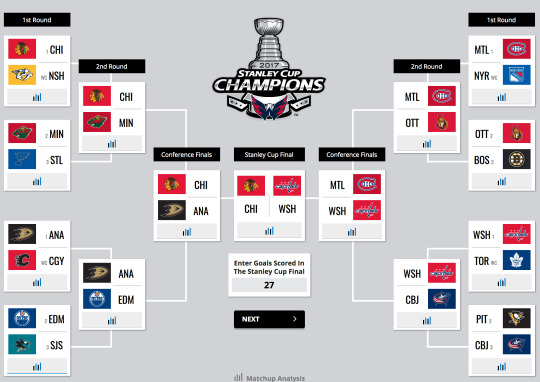
Above are my predictions for the playoffs for the NHL 16-17 season. After a remarkable break out campaign from Connor McDavid, an amazing Columbus Blue Jackets coming out party and the many other wonderful stories that the NHL annually provides, it comes down to the best sporting time of the year. The moment, that every one of the 16 teams looks ahead at the next two months, hoping that they will write themselves into the history books forever. Whether it be an incredible overtime goal, a remarkable team effort, a bone crunching hit or a literal bone breaking shot block, the playoffs are where the players earn their money, glory and reputation. I really think that this year is as wide open as last year’s campaign and the Penguins and Sharks highlighted that, coming out of no where to battle it out in an epic fashion.
Overall Winner - Washington Capitals
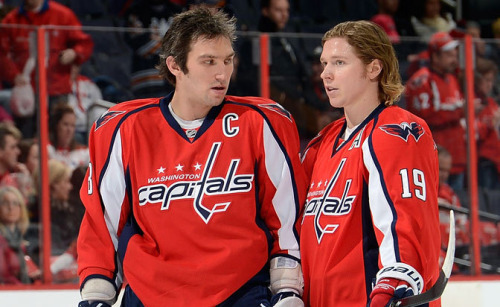
This is the year that Alex Ovechkin and his star studded lineup take it all the way and raise the Cup. Ovechkin is still the man that everyone fears when you play the Capitals, however in the past 2 seasons, teamwork and role players have definitely been a major reason as to why the Caps are back to back President’s Trophy winners. Ovechkin had his second lowest scoring output of his career (excluding the 48 game lockout season) and far fewer shots, shot attempts and his second lowest career shooting percentage. You would expect his team to take a dip, however the Capitals are stacked with offensive and defensive weapons. 15 players scored 10 or more goals this season including a career high 33 from T.J Oshie and a monster 86 point season from Nicklas Backstrom. Braden Holtby had his third Vezina like season in a row (more on him later) and the Capitals bolster 4 defenseman that had 30 points or more. This has to be the year. They have the depth in every department and Barry Trotz needs to find a way to unleash the regular season Ovechkin who has had on 10 playoff goals in a single campaign. He needs to show up and the Caps need to find a way to get passed the second round. With a potential match up against the Penguins, the going will be tough, but if any Caps team is going to win, it is this one.
Biggest Potential Surprise - Columbus Blue Jackets
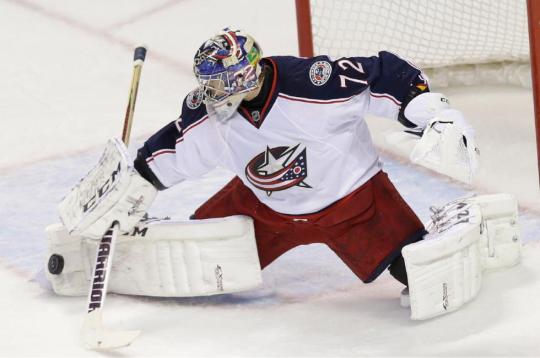
Now that it is April and the big names of Chicago, Pittsburgh, Anaheim and Washington are being thrown around as cup favourites, people have seemingly forgotten that Columbus did not lose in the entire month of December. To be fair the Jackets are playing their worst hockey of the season at the worst possible time, however they have an unbelievable team and the talent to make some noise. Ever since their remarkable run they have been a respectable 23-19-4 to finish 50-24-8. While the recent stretch might not sound impressive, remember this is a team that last year went 34-40-8 last season. They have had impressive resilience and are now bolstering the talent required to make a move in the Stanley Cup Playoffs. Led by a returned to form Foligno and leading scorer Cam Atkinson, the Blue Jackets have a lot of offensive depth. 12 players with 10 or more goals and 8 players with over 40 points gives you lots of scoring depth. Zach Werenski, David Savard and Seth Jones lead an very talented and youthful Defense that can score and put the hammer down on opposing offensive players (Can you imagine if pick number 2 Ryan Murray stepped up as well). With all this talent up front and down back, you can’t forget the performance of goaltender Sergei Bobrovsky. Bobrovsky had a career best 2.06 GAA (led the league) a matching career best save percentage of .932 (led the league), a career best 7 shutouts (= third in the league) and a career best 41 wins (third in the league). An absolutely remarkable season by a now reliable and dominant goalie. The Blue Jackets definitely have a test with the reigning champs in the first round, but if they do get passed them, be prepared for them to have a huge post season.
Biggest Potential Flop - Minnesota Wild
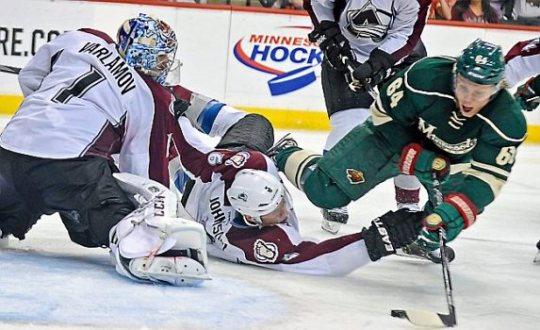
I love the Wild and they have a number of players that are very talented, however I feel they do not bring anything special that wins you a playoff series. They have a quality defense, a quality offense and a fantastic season from Devan Dubynk, however when you think of their team everyone that has had a good season is doing it in an under the radar fashion. They are a great team and after years of playoff failures, many expect them to go on and make the finals (in fact they are commonly the 4th favourite team to win according to Odds Shark and 6th favourite according to the Westgate Las Vegas Superbook). The problem in the past has been the Chicago Blackhawks and once again I expect that to be a huge problem for the under powered Wild. The Wild relied on a reformed Eric Staal, an aging defensive core and a breakout season from Granlund who scored 26 goals. In the prior 4 seasons of Grandlund’s career he had only scored 31 goals combined, so until he can bring it in the playoffs I remain hesitant to say he is the difference maker against a stacked Chicago team which still has the core 4 together of Seabrook, Keith, Kane and Toews. I expect another early exit for the Wild who must be cursing Chicago’s existence.
Player to Watch - Connor McDavid
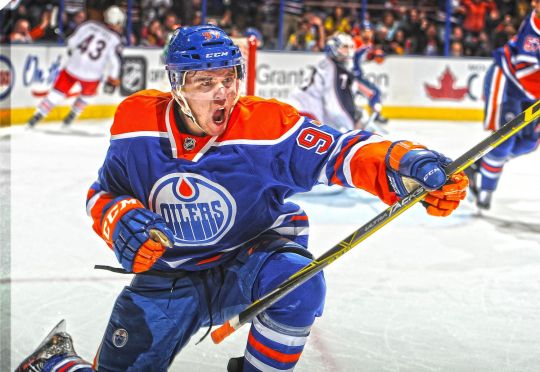
This is an absolute no brainer. McDavid at 20 years of age became the Art Ross winner (likely Hart winner as the MVP) with 100 points. He ended the year with a 14 game point streak and since the beginning of 2017 has only had 5 games without scoring at least 1 point. The kid is an absolute beast and with 70 assists makes everyone him that much better. Maroon, Lucic and Draisaitl have experienced this first hand with 2 of the 3 having career seasons. He is also dynamic in turning defensive opportunities into break aways. He has scored so many break away goals/set up 2 on 1 goals due to his ability to read the play and also is incredible speed up and down the ice. It is his first experience with NHL playoff hockey and he has taken a team back to the playoffs for the first time since 2006. A big, rough and tumble team that can score goals with an impressive young goalie is definitely a good mix when you add in a 20 year old coming off a 100 point season. Expect the kid to make an impact against the Sharks straight away. Oh also, McDavid has enjoyed making the Sharks look like a joke with 4 goals and 4 assists in 5 games this season, which marked his best output against any team this season.
Make or Break Season - San Jose Sharks
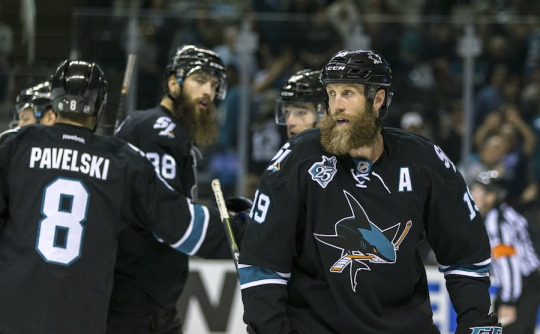
Speaking of the Sharks, boy are they in for a challenge. A team renowned for choking and terrible output in the most crucial times, showed everyone just how much fight they had last season. Knocking off a very good Kings in 5, pulling out a clutch game 7 against a feisty Predators team and then blowing away the Blues after losing game 1. They were completely outclassed when it mattered most, but fought and fought right to the bitter end (Pavelski is probably still having nightmares about this miss). Now this is the year where I firmly believe their window will is well and truly close behind them when they eliminated. Compared with their opponent, the Sharks are much older and much more banged up. The Oilers are coming in with their full lineup, while the Sharks are surrounded by the Joe Thornton and Logan Couture injury cloud. You take the top 2 centers from any team and they look very shaky regardless of who they are (Imagine if this was McDavid and Nugent-Hopkins from the Oilers missing). What is the most troubling for the Sharks is they have key players that are aging/or unrestricted free agents. The core of Marleau (37), Joe Thornton (37), Joe Pavelski (32), Brent Burns (32), Paul Martin (36), Marc-Edouard Vlasic (30) and Joel Ward (36) are definitely a troubling sign for the Sharks. Especially when Marleau and Thornton are unrestricted and rumours suggest either Martin or Dillon will be scooped up by Las Vegas and the expansion draft. This may well and truly be the end of the San Jose Sharks as we know them. While this isn’t a bad thing, it just means that while Meier, Donskoi, Labanc and O’Regan are developing, guys like Burns and Pavelski will be wasted. Who knows, I could be wrong and these guys develop quickly and Doug Wilson can replace these leaving bodies with talent, but the future looks bleak. Many, many fans will tell you last year was the only chance this team had and it looks grim for the Sharks with the current injuries, lack of home ice and first round opponent. If the Sharks do get through the first round, the outcome looks much more promising however, so don’t count them out yet.
Conn Smythe Winner - Braden Holtby
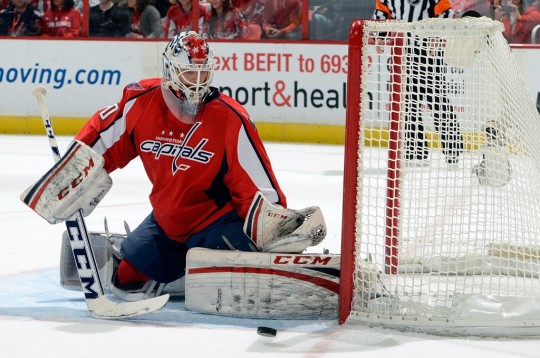
Going along with the Capitals prediction to win, suggests they are going to need an absolutely stellar performance from their goalie. This is the case for every team that wins the Cup Finals. Just look at Matt Murray, Corey Crawford and Jonathan Quick’s efforts from the past few years as an example. If anyone can do it, it’s Braden Holtby. We have seen him put up his third 40 or more win season in a row and he has done so in career best fashion, posting bests in Goals Against, Save Percentage, Shutouts and was rewarded with the Jennings trophy. Holtby is extremely reliable in terms of his decision making and is renowned for making incredible saves to keep his team in games when they really don’t deserve to be. This season he has played less games than 2014-15 and 2015-16 and has the extra rest to carry into the playoffs. If the Capitals finally find their offense in the playoffs and Holtby continues his impressive run of performances, then he is no doubt going to be responsible for the Caps lifting Lord Stanley. He has never faltered for the Capitals in the playoffs, through 46 total games played he has 4 shutouts, a 937 save percent and a ridiculous 1.72 goals against. Statistics such as these and his impressive regular seasons of the past 3 years add up to a Conn Smythe winner if his skaters give him support.
2 notes
·
View notes
Photo

CHAMPIONSHIPS GAME 01: PALMETTO STATE FOXES vs. UNIVERSITY OF TEXAS LONGHORNS
PRE-GAME
A Championships game means a Friday of missed classes—though, with the University of Texas located outside of an 800 mile radius of Palmetto, the Foxes having been given permission by the University to fly instead of drive. They meet at the Foxhole Court earlier in the day to make the drive to Upstate Regional Airport, and from there onto the plane that will take them to Austin. The team splits up upon landing and retrieving their gear from baggage claim, onto one bus driven by Wymack and another driven by Abby, while the Vixens—who had been on the same flight—pile into yet another rented car. They meet up again near the UT stadium for a quick dinner, and go from there to the court, arriving there with plenty of time to spare before first serve.
It’s enough time for them to settle after their travels, but it’s also enough time for nerves to set in. This is the biggest game they’ve played all season: a sold-out crowd and a bevy of reporters and camera crews in the stands. While the Foxes don their orange-on-white away uniforms and gather for a particularly gruff pep talk from Wymack—“They want to prove that we don’t deserve to be here, let’s show them that we do. We need to win two out of the next three games to advance, so go out there and make it happen.”—spectators file in to fill the stadium. They’re wearing orange, but it’s not for the Foxes, as the Longhorns and the Foxes share team colors. The Vixens claim one side of the court while the Longhorns’ cheerleaders take the other, trying to find friendly faces in the crowd.
Half an hour before first serve, the Foxes are allowed onto the court for a brief warm-up. They line up in order of position—Strikers, then Dealers, then Backliners, then Goalkeepers, with Grant and Claudia in the front as Captain and Vice-Captain—and enter the stadium. Looking out into the crowd, Justin sees familiar faces: his adoptive family, the Fletchers, are sitting in the stands for the Foxes’ first Championships game. Marley, too, sees someone she recognizes, though is far less eager to see: her ex-husband making his second appearance of the year, after following her to Edgar Allan earlier during the season. When she stops dead during their warmups, Colin follows her shell-shocked gaze to find Samuel and steps up alongside her, coaxing her back into the Foxes’ laps around the court, keeping himself in between Marley and the stands the entire way.
After the warm-up, Grant meets the Longhorns’ captain at center court for the coin toss that will determine who gets first serve. The Foxes win the toss, and the starting players take their positions for the start of play, while the rest take their spots on the bench—including Joel, sitting out of the first game of championships due to a red card in the Foxes’ last game.
FIRST HALF
STARTING LINEUP:
Goalkeeper: Eliana Felix (Sub: Beck Wang)
Dealer: Marley Reid (Sub: Sasha Hart-Ashby)
Strikers: Wyatt Owens, Jay Wright (Sub: Akira Sato)
Backliners: Zia Mendez, Colin Jessup
The Foxes stare down the Longhorns as they wait for the buzzer that will start play. It sounds, and the Longhorns break position to rush the Foxes as Marley, determinedly keeping her focus on the court and not who lurks in the stands, serves up the court to Jay.
There’s a reason the Longhorns are in the Championships, and it quickly becomes apparent: they’re capable of seizing the Foxes’ smallest mistakes and turning them into opportunities. The Foxes start the game with possession and they quickly lose it: first, a Longhorns backliner steals possession from Jay with a hard stick check; then, the Longhorns run the ball up the court in a seamless and lightning-fast series of passes that puts them within scoring distance—and, in the blink of an eye, the goal lights up red, the Longhorns scoring the first point of the night against Eliana.
The first goal makes the Foxes tense—it happened so fast, and they can’t afford to give any goals away, can’t afford to lose. The Longhorns serve to start play again, and their offense pushes its way rapidly towards the Fox goal. Colin and Zia rush to meet them, and Marley falls back to assist, but a complicated series of feints gives the Longhorns an opening, which they turn into another goal.
Before the reset of play, Wymack and Sebastian call the Foxes on the court to the court door in an attempt to bolster their floundering spirits, and give them a set of instructions: whatever they do, even if they don’t score, keep the Longhorns behind the half court line.
The Longhorns serve to restart play and Marley takes her Coaches’ instructions to heart, throwing herself against the Longhorns’ dealer with renewed vigor. The dealer responds in kind, and Marley is soon, fueled by her anger at Samuel, playing more aggressively than she has all season.
Two goals have given the Foxes some idea of how the Longhorns work, and they begin to better predict their opponents and stay ahead of their plays. Colin and Zia are using all their speed and aggression to hold their own against the Longhorns strikers, checking them hard whenever they can legally get away with it, while Marley matches the Longhorns dealer step-for-step.
Play stays bottled up near center court until Marley turns her attention away from her opponent for just long enough to fire off a pass to Wyatt—and that’s when the dealer hooks her body underneath Marley’s, sending her airborne before she topples to the ground—a split second after Wyatt earns the Foxes their first point of the night.
The Foxes are incensed—Eliana in particular, who has to be kept in the goal by Zia. Marley gets back to her feet and shakes herself off, arguing with Abby and Wymack to remain on the court while the referees debate their call. When it comes, it isn’t friendly to the Foxes: only a yellow card for the Longhorns dealer, who remains on the court to face off against Marley again, who won the fight to stay on the court.
Marley serves, and it begins again, the two dealers locked in a nasty battle at center court while the rest of the game surges around them. Wymack, however, had given her instructions when he sent her back on to play: provoke her, and you’ll get her ejected from the game. It isn’t her usual style of play, but she puts her all into it: when the dealer finally snaps and hits Marley first, she doesn’t hit back—although several of the Foxes are less restrained.
Colin and Eliana are the first to join the fray, Zia unable to keep her in the goal this time. The fight quickly grows before the referees can intervene, drawing in the rest of the Foxes and the Longhorns. A hard punch from one of the Longhorns’ backliners knocks Jay’s helmet clean off, but he doesn’t let that stop him from hitting back.
When the referees finally break it up, blame falls squarely on the Longhorns’ dealer: too many players had joined in too quickly for anyone else to be singled out. Ejected from the game, she stalks off the court and another dealer is sent on, and the Foxes are awarded a penalty shot.
Wymack uses the halt in play both to chew out his players for allowing themselves to be dragged into a fight and to make some substitutions to his line, sending Beck on for Eliana and Akira on for Wyatt—who he also tasks with taking the Foxes’ penalty shot.
Penalty shots are easy points and, with the Longhorns ahead, the Foxes need all the points they can get—and Akira, still a Class I rookie, needs to build his confidence on the court. After taking a long moment to center himself, he shoots, and the goal lights up red, and the score is tied.
It doesn’t last for long. A blocked shot on goal by Jay gives the Longhorns an opening: their goalkeeper slams the ball down the court, where it’s scooped up by one of their strikers, and the tables are turned. Colin meets him, but both the Longhorns strikers pile on him before Zia or Marley can get there, and Colin hits the court wall hard, unable to regroup fast enough to stop the striker from scoring against Beck.
With the clock winding down and the Longhorns ahead, Wymack sends Sasha on for an exhausted Marley, hoping that a fresh player will give the Foxes one last-ditch effort to tie up the score—and relying on Colin and Zia, who have practice playing full halves, to hold down their side of the court for a few minutes more.
The Longhorns serve, but their run up the court is stopped by Zia, who lays one of their strikers out flat before stealing possession and passing up the court to Sasha. Resisting a check that might have knocked her off her feet, she fires off a pass to Jay, which puts him in perfect scoring distance—tying up the score again in the last minutes of the half.
The buzzer sounds and the score remains tied, 3-3.
HALFTIME
The Foxes file off the court, passing by the Vixens, who take the floor for their half time routine. In the locker room, the atmosphere is tense. They played hard during the first half, and yet they’re still tied—to pull out a win in the second half, they need to be even better. The Longhorns have speed on their side, but what really sets them apart is their teamwork—which has always been the Foxes’ weakest point, despite their players’ individual talents. After fifteen minutes spent rehydrating and restrategizing, the Foxes return to the court, and the starting players, their faces set and determined, file through the court doors and take their places for the start of the second half.
SECOND HALF
STARTING LINEUP:
Goalkeeper: Cecil James (Sub: Cameron Trask)
Dealer: Claudia Jewell (Sub: Teddy Ryker)
Strikers: Logan Trask, Arlo Booth
Backliners: Justin Acevedo, Casey Hendrix (Sub: Sydney McCray)
The starting players take their positions and, at the sound of the buzzer, Claudia serves to start the half, heaving the ball up the court to Logan before falling back with Justin and Casey to hold the Longhorn’s aggressive offense at bay.
Knowing that a win tonight puts the Foxes one game closer to facing off against Ohio State, Casey takes to the court with determination, holding his striker mark at bay with single-minded focus and intensity. Justin, bolstered by the presence of the Fletchers in the stands, is likewise driven to do well, and they hold down their sides of the court with determination, Claudia in between them.
Logan takes possession of the ball and moves quickly, rebounding the ball off the court wall to pass to himself when his ten steps are up without pause, passing to Arlo just long enough to put himself in position to score, and when Arlo passes the ball to him, it’s a perfect assist—landing the ball in his racquet at just the right angle so he doesn’t have to pause and aim, he just has to shoot.
A one point lead with most of the half left to go might not be anything to brag about, but Logan and Arlo clack sticks and turn gloating grins on the Longhorns anyway as they take their positions for Claudia to serve again.
Claudia serves huge, and Arlo sprints down the court to snag it after it rebounds off the far court wall. The Longhorn backliners, however, are right behind him, using their momentum to check him into the court wall. He manages to hold onto possession, however, and pushes away from his opponents just long enough to pass—not to Logan, which the Longhorns expect, but back to Claudia, who’s right where he needs her to be.
When Claudia passes back to him, he's shaken off one of the Longhorns’ backliners and checks the other one hard on his dash towards the goal, sending him to the court floor, giving him an opening to shoot—and to score.
The Foxes are feeling pretty good, but their luck seems to run out just as quickly: the shots that Arlo and Logan take don’t land, and the Longhorns adjust to the Fox strikers’ style of play and get better at stealing possession, relying on Justin and Casey—and, the few times they get past them, Cecil—to hold the Foxes’ lead.
The Longhorns, seeing their lead slip away, start taking every opportunity they can to shoot on goal, even when they’re desperate shots, some of which don’t even come close enough for Cecil to have to block—until one manages to slip by. And Casey, who feels a lot of personal pressure riding on the game’s outcome, is frustrated enough to shoulder past the striker on his way back to his starting position, telling him it was a lucky shot.
As if to prove it, the next time that striker tries to make a dash up his side of the court, Casey’s check is forceful enough to send him airborne before laying him down flat. Casey throws the ball up the court to Claudia, but at the angry urging of the Longhorns’ Coach from the sidelines, play is halted as the referees review the check for unnecessary roughness. The yellow card he gets feels like a personal insult—but the referees had already shown bias before tonight, and so his teammates urge him to let it go.
Wymack uses the halt in play to send in his subs: Cameron on for Cecil, Teddy on for Claudia, Sydney on for Casey—with one yellow card under his belt, Wymack doesn’t want to have to risk sitting Casey out against Egar Allan. Save some for the Ravens, kid, he tells him, clapping him on the shoulder as he makes his way to the bench.
The Longhorns’ dealer serves to restart play, but they aren’t able to push far up the court before Sydney steals possession, throwing the ball up the court to Teddy—who, having gotten an earful from his father for having to sit out last game, feels like he has something to prove.
It happens in the blink of an eye and with everyone’s attentions focused further up the court, to where Arlo is tangling with a Longhorns backliner for possession, that a fight breaks out between Teddy and the Longhorns dealer, leading to their racquets dropped on the ground, each of them shoving each other. Sydney jumps in to pull Teddy back before the fight can progress any further, and by the time the referees open the court doors it is mostly wound down, but they give both Teddy and the dealer involved a yellow card.
Play is restarted from where it was halted, and as Teddy takes his place he determinedly doesn’t look off the court to where Wymack is standing, knowing that the look on his face would be one of disapproval.
The Foxes’ defense closes ranks to hold onto their small lead—but the Longhorns do the same and, no matter how often Teddy gets the ball to Arlo and Logan, they can’t seem to make anything happen.
Both sides appear deadlocked, holding the status quo, until the Longhorns steal possession in the final minutes of the game, and the Foxes watch with near-hopelessness as their offense pushes past Justin and Sydney for a clear shot on goal—knowing that a tie would take them to a shootout, where the Foxes’ smaller roster would put them at a distinct disadvantage.
Moments before the buzzer sounds, Cameron manages to block the shot, made towards the opposite side of the goal from her racquet, with the butt of her stick—breaking it, a fact that she doesn’t notice at first, the cheers sent up by her teammates as they pile on her covering up the crack it made as it broke.
The final buzzer sounds, and the Foxes have won their first championship game by the smallest of margins: 5-4.
POST-GAME
The game was exhausting, their victory hard won, and the Foxes’ celebration is tempered by a grim realization: this is going to be hard. Three games in the first round, and they need to win at least two to move on. Tonight, they did what they had to do, but they have to do it again and again—and, never time, against an even more formidable opponent. The Foxes line up to shake hands with the Longhorns before filing off the court and into the away team locker rooms—save for Justin and Cameron, who peel off from their teammates towards the stands where the Fletchers stand waiting. In the locker room, Wymack congratulates them on their victory and puts Jay and Akira on press duty.
They have hotel rooms in Austin for the night—as do the Vixens—and once Jay and Akira finish with the press, shower, change out, and meet the rest of their teammates in the lounge, they file onto their rented buses with their gear and make their way to the hotel. Once there, Abby distributes hotel room keys, leaving the Foxes to decide who rooms with who. Their flight back home is early the next morning, and Wymack discourages them from keeping each other up all night in celebration with a long-suffering tone that suggests he knows he likely won’t be listened to, before he retreats behind his do not disturb sign for the night, leaving his team to their own devices.
ADMIN NOTE: And that’s it, the first Championships Game! As a reminder, you’re welcome to set threads during any of the periods listed above (pre-game, expanding on the events of the game itself, halftime, post-game) and I can’t wait to see what you come up with! As always, please let me know if you have any questions or feedback, and I’ll see you back here in two weeks for a rematch against the Ravens.
10 notes
·
View notes
Text
Bookshelf Briefs 5/21/18
Anonymous Noise, Vol. 8 | By Ryoko Fukuyama | Viz Media – This was more of a band volume than a romantic triangle volume, and I appreciated that. Momo and Yuzu have to learn here that in order to survive, they have to write songs that are for other people, as well as songs that occasionally make compromises—such as being easier to sing. They do this by running into two annoying idols whose annoyingness turns out to be half front (and half being annoying). Elsewhere, Miou is having trouble dealing with being in a relationship when she’s still in love with Yuzu, and tries to deal with both issues at the same time, with limited success. And as if that weren’t enough, BATTLE OF THE BANDS again. Shojo’s Beat’s most addictive potboiler. – Sean Gaffney
Baccano!, Vol. 3 | By Ryohgo Narita, Shinta Fujimoto and Katsumi Enami | Yen Press – This final volume of the manga is a relatively straightforward adaptation of the first volume, with a few Easter Eggs thrown in for hardcore novel fans, such as a flashforward to Firo and Ennis’ wedding (Christopher! Rail! People blocked by an annoying arm!). Of course, the manga is cagey about when that wedding takes place—trust me, it’ll be a while. As for other aspects of the adaptation, it’s worth noting that Enami more than the anime or the novels is making Isaac and Miria explicitly a romantic couple rather than a mere comedy double act. There’s some really sweet moments here that shows off their love. Baccano! fans who saw the anime and read the novels will want this too. – Sean Gaffney
Black Clover, Vol. 11 | By Yuki Tabata | Viz Media – There’s a lot going on here, and as always with Black Clover very little of it will take you by surprise. We see brainwashed villains overcoming it (as well as villains in love), Asta manages to control his anti-magic and become more powerful, and an arrogant sneering villain gets to apologize. We also see Vanessa face off against the Queen of Witches, which gives us a nice opportunity to talk about how much Jump loves found families. A whole lot. The whole is not greater than the sum of its parts—honestly, the whole is about the same as the parts—and I suspect I’ll forget what happened in this volume before the next. But I do enjoy Black Clover as I read it. It’s dumb fun. – Sean Gaffney
The Bride Was a Boy | By Chii | Seven Seas – It probably isn’t much of a surprise that The Bride Was a Boy was one of the manga releases that I was most looking forward to this year. It’s fairly rare in translated manga to see realistically portrayed characters who are transgender, but rarer still is the opportunity to read a manga that is both about and by someone who actually is transgender. The Bride Was a Boy is the autobiography of Chii. It’s an adorably sweet manga about her experiences as a transwoman in Japan, including aspects of her transition and her marriage to her wonderful husband. Some may criticize the work for being too free of conflict–that it doesn’t adequately show the hardships that so many transgender people face–but it’s incredibly refreshing to see such a charming and positive work. Happy, hopeful stories about transgender lives are valuable and important to have, too. – Ash Brown
Chihayafuru, Vol. 11 | By Yuki Suetsugu | Kodansha Comics (digital only) – Mizusawa’s karuta club has earned a spot at the national tournament no matter what happens in their final match against Hokuou, though it’s still a disappointment when they don’t come away with the victory. Part of the problem is that Chihaya is looking ahead to her next game against Shinobu and spends the entire first half trying to improve her accuracy rather than relying on her real strength—having a higher number of “one-character cards” than anyone else. I love that her resulting funk is short-lived and that her perseverance also serves as an inspiration for her sister, who’s having a bit of a career crisis. After a nice bit of encouragement from the wind instruments club, the gang is off to nationals. I consistently love this series more with every volume and don’t foresee that ever changing. – Michelle Smith
Delicious in Dungeon, Vol. 5 | By Ryoko Kui| Yen Press – The joy of getting Falin back lasts for about five pages into this fifth volume, and I hope you weren’t looking forward to her as part of the team. But no, instead we get a new villain, the “Lunatic Magician,” who shows the reader what they had guessed all along—Falin came back wrong. Hopefully we’ll see more of her later, but for the moment our heroes have to go back to the surface—they’ve finally gone as far as they can living off the dungeon. We also meet a few other groups, some of whom are familiar with Laos and company, and learn that Laos and Falin are viewed as… rather creepy by everyone else in the area. The series is getting darker, but I’m still enjoying the places it’s going. – Sean Gaffney
Everyone’s Getting Married, Vol. 8 | By Izumi Miyazono | Viz Media – The series proves to be very good at looking at multiple aspects of a long term, non-married relationship, and that’s good news for the reader but bad news for Asuka, who has to deal with her workplace hearing she’s involved, and thus demoting her as they expect her to leave to be a housewife. This is so very, very Japan and it’s sad that everyone treats it as “yeah, that’s what happens.” Asuka and Ryu try their best, but she’s also hammered on by the folks in the United States that they need Ryu to be there—and not with Asuka. As such, the end of this volume is sad but inevitable. Fortunately, it’s not the end of the series. This was a bit excruciating, but well told. – Sean Gaffney
Haikyu!!, Vol. 23 | By Haruichi Furudate | Viz Media – This is the second volume in a row not to deal with the main Karasuno club, as we’re still playing out Nekoma’s match for the majority of the book. It’s a good match, but I must admit it does not exactly lend itself to new things to say in a review. Cool things happen, people learn about volleyball, their are heartfelt flashbacks, and eventually a team is the winner. The next volume definitely looks like it’s heading back to Kageyama, though, as he’s been picked as what sounds like the equivalent of an All-Pro. Can be do actual teamwork with a team other than his own, though? And what does Hinata feel about this? Fine out next time, same Haikyu-time, same Haikyu-channel. – Sean Gaffney
Tales of Wedding Rings, Vol. 2 | By Maybe | Yen Press – There’s a bit of fanservice here, but for the most part Tales of Wedding Rings impresses me by not going for the obvious harem fantasy tropes. We travel to the country of the elves to meet the next princess (described in the blurb as well-endowed, presumably to separate her from the well-endowed main heroine). Unfortunately, Nefritis is a massive introvert with a fear of others, and her brother not only has a massive brother complex but also seems to have a hate-on for the ring bearer—the two may be connected. There’s some emotional scenes and a nice battle in among the cliches here, and while I’m expecting more well-endowed girls next time around, I still think this is worth your time. – Sean Gaffney
Wake Up, Sleeping Beauty, Vol. 4 | By Megumi Morino | Kodansha Comics – Wake Up, Sleeping Beauty has always been good, but I was not expecting so many feels. It all starts so well. Shizu has come so far as her true self, and has a lovely evening with Tetsu at the summer festival. Tetsu patches things up with Chihiro, whom we learn sees a lot of himself in Shizu. With Chihiro’s encouragement, Tetsu begins to ask the spirits occupying Shizu about their lingering regrets, hoping to maybe help them move on. It’s so hopeful! And then evil dad returns and we’re plunged into bleak darkness. Thankfully, it’s brief, as Tetsu has come to care too much about Shizu to let his guilt over being paid to befriend her keep him from helping her escape her dad’s clutches. Evil dad won’t be happy with this turn of events, but I personally can’t wait to see what happens next. – Michelle Smith
By: Michelle Smith
0 notes